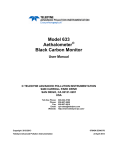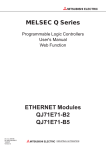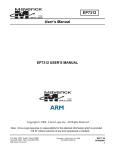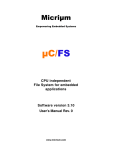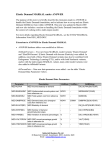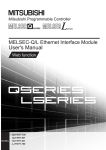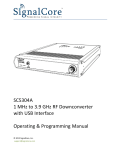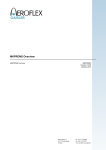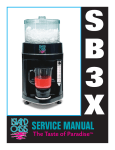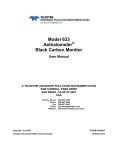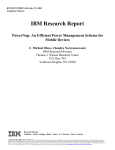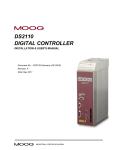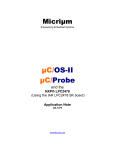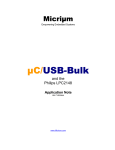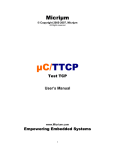Download µC/FS
Transcript
µC/FS File System Software Version 1.26 CPU independent User & Reference manual Micriµm Technologies Corporation www.micrium.com Empowering Embedded Systems 2/123 User's & reference manual for µC/FS Disclaimer The information in this document is subject to change without notice. While the information herein is assumed to be accurate, Micriµm Technologies Corporation (the vendor) assumes no responsibility for any errors or omissions. The vendor makes and you receive no warranties or conditions, express, im plied, statutory or in any communications with you. The vendor specifically disclaims any implied warranty of merchantability or fitness for a particular purpose. Copyright notice No part of this publication may be reproduced, stored in a retrieval system, or transmitted, in any form or by any means, electronic, mechanical, photocopying, recording, or otherwise, without the prior written permission of the vendor. The Software described in this document is furnished under a license and may only be used or copied in accordance with the terms of such a license. If you have received this product as trial version for evaluation, you are entitled to evaluate it, but you may under no circumstances use it in a product. If you want to do so, you need to obtain a fully licensed version from the vendor. 2002 Micrium Technologies Corporation http://www.micrium.com/ Trademarks Names mentioned in this manual may be trademarks of their respective companies. Brand and product names are trademarks or registered trademarks of their respective holders. Contact Micrium Technologies Corporation 949 Crestview Circle Weston, FL 33327-1848 U.S.A. Phone : +1 954 217 2036 FAX : +1 954 217 2037 Email: [email protected] Web: http://www.micrium.com/ 2002 Micrium Technologies Corporation User's & reference manual for µC/FS 3/123 Software and manual versions This manual describes the software version 1.10. If any error occurs, please inform us and we will try to assist you as soon as possible. For further information on topics or routines not yet specified, please contact us. Print date: 1/13/2003 Software 1.26 1.24 1.20 1.10 1.00 Manual Date By 1 030113 TB 1 1 1 1 021205 021010 020927 020830 TB TB TB KG 2002 Micrium Technologies Corporation Explanation Support for trial version added. FS__fat_malloc returns cleared buffer. MMC driver deactivates CS whenever allowed by specification. FAT32 & POSIX like directory functions added IDE & CompactFlash driver added MultiMedia & SD card driver added Revised for language/grammar. Version control table added. Typographic conventions (section 1.3) changed into table. Index added. 4/123 User's & reference manual for µC/FS Contents Disclaimer........................................................................................................................................... 2 Copyright notice ................................................................................................................................ 2 Trademarks ........................................................................................................................................ 2 Contact................................................................................................................................................ 2 Software and manual versions ........................................................................................................ 3 Contents ............................................................................................................................................. 4 1. About this document .................................................................................................................... 6 1.1. Assumptions ..................................................................................................................... 6 1.2. How to use this manual .................................................................................................. 6 1.3. Typographic Conventions for Syntax............................................................................ 6 2. Introduction to µC/FS ................................................................................................................... 7 2.1. What is µC/FS? ................................................................................................................ 7 2.2. Features ............................................................................................................................ 7 3. Basic concepts .............................................................................................................................. 8 3.1. API Layer........................................................................................................................... 8 3.2. File System Layer ............................................................................................................ 8 3.3. Logical Block Layer ......................................................................................................... 9 3.4. Device Driver .................................................................................................................... 9 4. Getting started.............................................................................................................................10 4.1. Installation.......................................................................................................................10 4.2. Use the Windows sample .............................................................................................10 4.3. Integrating µC/FS into your system ............................................................................15 5. Configuration of µC/FS ..............................................................................................................17 5.1. fs_conf.h..........................................................................................................................17 5.2. fs_port.h...........................................................................................................................21 6. API functions ...............................................................................................................................24 6.1. File system control functions ........................................................................................25 6.2. File access functions .....................................................................................................27 6.3. Direct input/output functions ........................................................................................30 6.4. File positioning functions ..............................................................................................32 6.5. Error-handling functions ................................................................................................34 6.6. Operations on files.........................................................................................................36 6.7. Directory functions .........................................................................................................37 7. Device drivers..............................................................................................................................43 7.1. Device driver functions ..................................................................................................43 7.2. Device driver function table ..........................................................................................48 7.3. Integrate a new device driver.......................................................................................48 8. SmartMedia Card Device Driver ..............................................................................................50 This chapter describes all hardware access functions required by µC/FS’s generic SmartMedia driver. ................................................................................................................50 8.1. Control line functions .....................................................................................................51 8.2. Power control functions ................................................................................................57 8.3. Status detection functions ............................................................................................59 8.4. Data transfer functions ..................................................................................................66 8.5. Timer functions ...............................................................................................................68 9. MultiMedia & SD card device driver ........................................................................................72 9.1. Control line functions .....................................................................................................72 9.2. Operation condition detection and adjusting functions ............................................76 9.3. Status detection functions ............................................................................................79 9.4. Data transfer functions ..................................................................................................82 10. CompactFlash card & IDE device driver...............................................................................88 10.1. Control line functions ..................................................................................................88 2002 Micrium Technologies Corporation User's & reference manual for µC/FS 5/123 10.2. ATA I/O register access functions ............................................................................91 10.3. Status detection functions ........................................................................................109 11. OS integration .........................................................................................................................111 11.1. OS layer control functions ........................................................................................111 11.2. Internal data structure protection............................................................................113 11.3. File access protection...............................................................................................117 11.4. Device access protection .........................................................................................119 11.5. Time/Date functions ..................................................................................................121 Index................................................................................................................................................123 2002 Micrium Technologies Corporation 6/123 User's & reference manual for µC/FS 1. About this document This guide describes the functionality and user API of µC/FS FAT File System. 1.1. Assumptions This guide assumes that you already have a solid knowledge of the following: • The software-tools used to build your application (assembler, linker, "C"compiler) • The C-language • The target processor • DOS-command -line If you feel your knowledge of C is not good enough, we recommend The C Programming Language by Kernighan and Richie (ISBN 0-13-1103628), which describes the standard in C-programming and in ne wer editions also covers ANSI C. 1.2. How to use this manual This manual explains all the functions and macros that µC/FS offers. It assumes you have a working knowledge of the C-Language, knowledge of assembly programming is not required. 1.3. Typographic Conventions for Syntax This manual uses the following typographic conventions: Style Body Keyword Parameter Sample Emphasis Term Used for Body text. Text that you enter at the command-prompt or that appears on the display (i.e. system functions, file- or pathnames). Parameters in API functions. Sample code in program examples. Very important sections. Important terms. 2002 Micrium Technologies Corporation User's & reference manual for µC/FS 7/123 2. Introduction to µC/FS 2.1. What is µC/FS? µC/FS is a FAT file system which can be used on any media, for which you can provide basic hardware access functions. . µC/FS is a high performance library that has been optimized for speed, versatility and memory footprint. 2.2. Features µC/FS is written in ANSI C and can be used on virtually any CPU. Some features of µC/FS are: • MS-DOS/MS-Windows compatible FAT12 and FAT16 support. • Multiple device driver support. You can use different device drivers with µC/FS, which allows you to access different types of hardware with the file system at the same time. • Multiple media support. A device driver does allo w you to access different medias at the same time. • OS support. µC/FS can easily be integrated into any OS. In that way you can make file operations in a multithreaded environment. • ANSI C stdio.h like API for user applications. An application using standard C I/O library can easily be ported to use µC/FS. • Very simple device driver structure. µC/FS device drivers need only very basic functions for reading and writing blocks. Therefore it is very simple to support your custom hardware. • Generic device driver for SmartMedia cards, which can easily be used with any kind of card reader hardware. • Generic device driver for MultitMedia & SD cards using SPI mode, which can be easily integrated. 2002 Micrium Technologies Corporation 8/123 User's & reference manual for µC/FS 3. Basic concepts µC/FS is organized in different layers. In this chapter, you will find a short description of the functionality of each layer. API Layer <stdio.h> like functions, such as FS_fopen, FS_fread, etc. File System Layer Translation of file operations to sector operations. Logical Block Layer Synchronization of device operations for different file operations. Device Driver Low level routines to access sectors of a device and to check status. 3.1. API Layer The API layer is the interface between µC/FS and the user application. It does contain a library of ANSI C oriented file functions, such as FS_FOpen, FS_FWrite etc. The API layer does transfer these calls to the file system layer. Currently there is only a FAT file system layer available for µC/FS, but the API layer can deal with different file system layers at the same time. So it is possible to use FAT and any other file system at the same time with µC/FS. 3.2. File System Layer The file system layer translates file operations to logical block operations. After such a translation, the file system calls the logical block layer and specifies the corresponding device driver for a device. 2002 Micrium Technologies Corporation User's & reference manual for µC/FS 9/123 3.3. Logical Block Layer The main purpose of the logical block layer is to synchronize accesses to a device driver and to have an easy interface for the file system layer. The logical block layer does call a device driver to make a block operation. 3.4. Device Driver Device drivers are low level routines that are used to access your hardware. The structure of the device driver is simple to allow easy integration of your own hardware. 2002 Micrium Technologies Corporation 10/123 User's & reference manual for µC/FS 4. Getting started This chapter gives you a step by step introduction on how to use µC/FS. 4.1. Installation µC/FS is shipped on CD-ROM or as a .zip file in electronic form. In order to install it, proceed as follows: If you received a CD, copy the entire contents to your hard-drive into any folder of your choice. When copying, please keep all files in their respective subdirectories. Make sure the files are not read-only after copying. If you received .zip file, please extract it to any folder of your choice, preserving the directory structure of the .zip file. 4.2. Use the Windows sample If you have MS Visual C++ 6.00 or later version available, you will be able to work with a Windows sample project using µC/FS. Even if you do not have the Microsoft compiler, you should read this chapter to understand how an application can use µC/FS. 4.2.1. Building the sample program Open the Workspace I86_MS_Start.dsw with MS Visual Studio by e.g. double clicking it. There is no further configuration necessary. You should be able to build the application without any error or warning message. 4.2.2. Stepping through the sample The sample project uses the RAM disk driver for demonstration. It will create two files in the RAM disk and then dump contents of these files to the console window. After starting the debugger by stepping into the application, your screen should look as shown in Figure 4-1: 2002 Micrium Technologies Corporation User's & reference manual for µC/FS 11/123 (1) Call FS_Init() before any other calls to µC/FS. (2) Call Maintask() Figure 4-2) (see (3) Closing the File System. Figure 4-1 F4-1(1) One of the first things called in the sample program is a call to the µC/FS function FS_Init().This function initializes the file system and must be called before using any other µC/FS function. You should step over (F10) this function. F4-1(2) When you reach the call to MainTask(), you should step into (F11) this function and your screen should look as shown in Figure 4 -2: (1) Call to FS_IoCtl() to format the RAM disk. (2) Call _write_file() (3) Call _write_file() write to another file to (4) Call to _dump_file() display the contents default.txt to of (5) Displaying the contents of ram.txt. 2002 Micrium Technologies Corporation 12/123 User's & reference manual for µC/FS Figure 4-2 F4-2(1) There is a call to the µC/FS function FS_IoCtl(). This call is used to format yo ur RAM disk in order to be able to write data to it. Formatting your RAM disk should not cause any problem. F4-2(2) You should get to the call of function _write_file() without any error message. Please note that _write_file() is not a µC/FS function -- it is part of the sample application. After stepping into (F11) that function, your screen should look as shown in Figure 4 -3: (1) Call to FS_FOpen() (2) Writing an ASCII string with FS_FWrite() (3) Closing the file with FS_FClose() Figure 4-3 F4-3(1) You should get to the µC/FS function call FS_FOpen(). This function creates a file named default.txt in the root directory of your default device, which is the RAM disk in this example. Step over (F10) this function, which should return the address of an FS_FILE structure. In case of any error, it would return 0, indicating that the file could not be created. F4-3(2) If FS_FOpen returns a valid pointer to an FS_FILE structure, the sample application will write a small ASCII string to this file by calling the µC/FS function FS_FWrite(). Step over (F10) this function and watch the return value. If no problem occurs, it should match with the length of the text. In case there have been less characters written, the sample project checks for an error code by calling the µC/FS function FS_FError(). F4-3(3) Continue stepping over (F10) until you reach the call to µC/FS function FS_FClose(). This will close the file “default.txt”. Step over (F10) this function and continue stepping over (F10) until you are back to MainTask() (see Figure 4-2). 2002 Micrium Technologies Corporation User's & reference manual for µC/FS 13/123 F4-2(3) You will get to the next call of _write_file(), which creates another file called “ram.txt” on your RAM disk. The difference between this and the first call is that this time, the RAM disk is specified explicitly. So the file will be created on your RAM disk, even if you use a different default device. F4-2(4) Continue stepping over (F10) until you reach the call to _dump_file(). Note that this function is also part of the example and not µC/FS. After stepping into (F11) the function, your screen should look as shown in Figure 4-4: (1) Opening default.txt (2) Read the file (3) Check for End-Of-File (EOF) (4) Closing the file Figure 4-4 F4-4(1) The sample application opens the previously created file default.txt for read operation by using the µC/FS function FS_FOpen(). If the file does not exist or cannot be opened for any reason, FS_FOpen() will return 0 instead of a valid pointer to an FS_FILE structure. 2002 Micrium Technologies Corporation 14/123 User's & reference manual for µC/FS F4-4(2) Continue stepping over (F10) until you get to the µC/FS function call FS_FRead(). Watch the contents of mybuffer and the return value when stepping over (F10) the function. You should see that FS_FRead() loads the contents of the file default.txt into mybuffer and returns the length of the string. If FS_FRead() returned data, it would be displayed on the console window with help of the sample application function _log. F4-4(3) Continue stepping over (F10), until you get to the second call to FS_FRead(). This time, FS_FRead() returns 0, because the file pointer has reached the end of file default.txt. The sample application calls FS_FError() to see if EOF (i.e. the End-Of-File) has been reached. F4-4(4) Finally, default.txt is closed by calling FS_FClose(). Continue stepping over (F10), until you get back to MainTask() (see Figure 4-2). F4.2(5) The second call to _dump_file() in MainTask() does the same thing as the previous call except that it displays the contents of ram.txt, the second file we wrote. Continue stepping over (F10) until you get back to the function main(), in Figure 4-1. F4-1(3) If your application terminates and thus, you don’t need to use the file system, you can close the whole file system by calling FS_Exit(). This function call stops µC/FS and you MUST NOT call any µC/FS functions except FS_Init() which is used to re-initialize the file system. Congratulations, you have successfully built and debugged your first application using µC/FS. 2002 Micrium Technologies Corporation User's & reference manual for µC/FS 15/123 4.3. Integrating µC/FS into your system In this chapter, you will learn how to add µC/FS to your system. We assume that you are familiar with the tools you have selected for your project (compiler, project manager, linker, etc.). You must thus be able to add files, directories to the include search path, etc. It is also assumed, that you are familiar with the OS you will be using in your target system, if you are using one. 4.3.1. Create a simple project without µC/FS We recommend, that you create a small “hello world” program for your system. That project should already use your OS and there should be a way to display text on a screen or serial port. 4.3.2. Add your µC/FS configuration In order to configure µC/FS for your system, you should create a new subdirectory in µC/FS’s config directory and copy the files fs_conf.h and fs_port.h from one of the other sub -directories to your directory. For the following chapters, we assume that you have created a directory FS\CONFIG\myconfig. Usually, the only file you have to modify is fs_conf.h. For an easy startup, we recommend, that you disable all drivers except the RAM disk driver. Please check out the chapter “Configuration of µC/FS” for detailed information about the configuration. 4.3.3. Add µC/FS generic source code Add all source files in the following directories: FS\API FS\FSL FS\LBL FS\OS FS\DEVICE\RAM and their sub-directories to your project. 4.3.4. Configure the search path In order to build all the files that you added, you will have to add the following directories to your path for include files: FS\API FS\CONFIG\myconfig FS\LBL FS\OS 4.3.5. Add generic sample code For a quick and easy test of your µC/FS integration, you should use the code found in FS\sample\main.c. 4.3.6. Build and test your application If everything is configured correctly, you should now be able to build an application containing a RAM disk on your target system.. If you encounter any problem during the build process, please check your include path and your 2002 Micrium Technologies Corporation 16/123 User's & reference manual for µC/FS configuration. Usually µC/FS‘s source code builds without any compiler warning. Once you can build the application, you should be able to use it with your target’s debugger environment just like we did with the Visual C++ sample project. Congratulations, you have successfully integrated µC/FS into your system. . 2002 Micrium Technologies Corporation User's & reference manual for µC/FS 17/123 5. Configuration of µC/FS In your configuration directory for µC/FS, you will find two files, which allow you to configure the file system according to your requirements. In this chapter, you will find a description of each of these files. 5.1.fs_conf.h This is the main configuration file for the file system. You define which drivers you want to use and, the configurations for these drivers. Example #ifndef _FS_CONF_H_ #define _FS_CONF_H_ /* ********************************************************************** * Micrium, Inc. * 949 Crestview Circle * Weston, FL 33327-1848 * * uC/FS * * (c) Copyright 2002, Micrium, Inc. * All rights reserved. * *********************************************************************** ---------------------------------------------------------------------File : fs_conf.h Purpose : File system configuration Usually all configuration of the file system for your system can be done by changing this file. If you are using a big endian system or a totally different architecture, you may have to modify the file "fs_port.h". ---------------------------------------------------------------------Version-Date-----Author-Explanation ---------------------------------------------------------------------1.00.00 20020815 First release ---------------------------------------------------------------------Known problems or limitations with current version ---------------------------------------------------------------------None. ---------------------------END-OF-HEADER-----------------------------*/ /********************************************************************* * * #define constants * ********************************************************************** */ /********************************************************************* * * Number of file handles * Set the maximum number of simultaneously open files in your system. Please be aware, that the file system requires one FS_FILE structure for each open file. If you are using FAT, each file will also require two sector buffers. */ #define FS_MAXOPEN 2002 Micrium Technologies Corporation 4 /* Maximum number of file handles */ 18/123 User's & reference manual for µC/FS /********************************************************************* * * OS Layer * Set all to 0, if you do not want OS support. */ #define FS_OS_EMBOS 1 /* 1 = use embOS */ #define FS_OS_UCOS_II 0 /* 1 = use uC/OS-II */ #define FS_OS_WINDOWS 0 /* 1 = use WINDOWS */ #if ((FS_OS_WINDOWS==1) && ((FS_OS_EMBOS==1) || (FS_OS_UCOS_II==1))) #error You must not use Windows at the same time as embOS or uC/OS-II! #endif /********************************************************************* * * Time/Date support * If your system does support ANSI C library functions for time/date, you can set this to 1. If it is set to 0, functions FS_OS_Get_Date and FS_OS_Get_Time will return the date 1.01.1980 0:00 unless you modify them. */ #define FS_OS_TIME_SUPPORT 0 /* 1 = time()/date supported */ /********************************************************************* * * File System Layer * You can turn on/off the file system layers used in your system. At least one layer has to be active. Because currently there is only one file system layer supported (FAT), you will usually not change this setting. */ #define FS_USE_FAT_FSL 1 /* FAT12/FAT16 file system */ /********************************************************************* * * Device Driver Support * You can turn on/off device driver supported in your system. If you turn on a driver, please check also its settings in this file below. */ #define FS_USE_SMC_DRIVER #define FS_USE_WINDRIVE_DRIVER #define FS_USE_RAMDISK_DRIVER 1 0 1 /* SmartMedia card driver */ /* Windows Logical Drive driver */ /* RAM Disk driver */ #if (!defined(_WIN32) && (FS_USE_WINDRIVE_DRIVER)) #error Windows Logical Drive driver needs Windows API #endif /********************************************************************* * * FAT File System Layer defines */ #if FS_USE_FAT_FSL /* For each media in your system using FAT, the file system reserves memory to keep required information of the boot sector of that media. FS_MAXDEV is the number of device drivers in your system used with FAT, FS_FAT_MAXUNIT is the maximum number of logical units supported by one of the activated drivers. */ #define FS_MAXDEV (FS_USE_SMC_DRIVER + FS_USE_WINDRIVE_DRIVER + FS_USE_RAMDISK_DRIVER) 2002 Micrium Technologies Corporation User's & reference manual for µC/FS #define FS_FAT_MAXUNIT 19/123 2 /* max number of medias per device */ /* Do not change following defines ! They may become configurable in future versions of the file system. */ #define FS_FAT_SEC_SIZE #define FS_FAT_MAXCLST change) */ #endif /* FS_USE_FAT_FSL */ 0x200 100000 /* do not change for FAT */ /* max cluster number (do not /********************************************************************* * * RAMDISK_DRIVER defines */ #if FS_USE_RAMDISK_DRIVER /* Define size of your RAM disk here. You specify the number of sectors (512 bytes) here. */ #define FS_RR_BLOCKNUM 32 /* 16KB RAM */ /* Do not change following define ! It may become configurable in future versions of the file system. */ #define FS_RR_BLOCKSIZE 0x200 /* do not change for FAT */ #endif /* FS_USE_RAMDISK_DRIVER */ /********************************************************************* * * SMC_DRIVER defines * Settings of the generic Smartmedia Card driver. For using SMC in your system, you will have to provide basic hardware access functions. Please check device\smc\hardware\XXX\smc_hw.c and device\smc\hardware\XXX\smc_hw.h for samples. */ #if FS_USE_SMC_DRIVER /* Number of card readers in your system. Please note, that even if your system does have more than one SMC slot, it might be unable to access them both at the same time, because they share resources (e.g. same data port). If that is true for your system, you must ensure, that your implementation of "FS_OS_Lock_deviceop(&_FS_smcdevice_driver,id)" blocks the device driver for all values of "id"; the default implementation of the file system's OS Layer does so. */ #define FS_SMC_MAXUNIT 2 /* EP7312 SMC + on board NAND */ /* The following define does tell the generic driver, if your system can directly check the SMC RY/BY line. */ #define FS_SMC_HW_SUPPORT_BSYLINE_CHECK 0 /* EP7312 does not support */ /* FS_SMC_HW_NEEDS_POLL has to be set, if your SMC hardware driver needs to be called periodically for status check (e.g. diskchange). In such a case, the generic driver does provide a function "void FS_smc_check_card(FS_u32 id)", which has to be called periodically by your system for each card reader. */ #define FS_SMC_HW_NEEDS_POLL 1 /* EP7312 needs poll for diskchange */ #endif /* FS_USE_SMC_DRIVER */ /********************************************************************* * * WINDRIVE_DRIVER defines 2002 Micrium Technologies Corporation 20/123 User's & reference manual for µC/FS * This driver does allow to use any Windows logical driver on a Windows NT system with the file system. Please be aware, that Win9X is not supported, because it cannot access logical drives with "CreateFile". */ #if FS_USE_WINDRIVE_DRIVER /* The following define tells WINDRIVE, how many logical drives of your NT system you are going to access with the file system. if your are going to use more than 2 logical drives, you will have to modify function "_FS_wd_devstatus" of module device\windriver\wd_misc.c. */ #define FS_WD_MAXUNIT 2 /* number of windows drives */ /* Specify names of logical Windows drives used with the file system. For example, "\\\\.\\A:" is usually the floppy of your computer. */ #define FS_WD_DEV0NAME "\\\\.\\E:" /* Windows drive name for "windrv:0:" */ #define FS_WD_DEV1NAME "\\\\.\\A:" /* Windows drive name for "windrv:1:" */ /* To improve performance of WINDRIVE, it does use sector caches for read/write operations to avoid real device operations for each read/write access. The number of caches can be specified below and must not be smaller than 1. */ #define FS_WD_CACHENUM 40 /* number of read caches per drive */ #define FS_WD_WBUFFNUM 20 /* number of write caches per drive */ /* Do not change following define ! It may become configurable in future versions of the file system. */ #define FS_WD_BLOCKSIZE 0x200 /* do not change for FAT */ #endif /* FS_USE_WINDRIVE_DRIVER */ #endif /* _FS_CONF_H_ */ 5.1.1.OS support You can specify whether you are using uC/OS -II, embOS, Windows or no OS support at all. Please set FS_OS_UCOS_II, FS_OS_EMBOS, FS_OS_WINDOWS to 1, respectively. For no OS support at all, set all of them to 0. If you need support for an additional OS, you will have to provide functions described in the chapter “OS integration”. 5.1.2.Time/Date support If you want to be able to add date and times to your files, you will need to set FS_OS_TIME_SUPPORT to 1. 5.1.3.File System Layer Support µC/FS can support different file system at the same time. You can enable them by setting FS_USE_XXX_FSL, where XXX is the name of the file system layer. The current version of µC/FS only supports the FAT file system, so you will need to set FS_USE_FAT_FSL to 1. 2002 Micrium Technologies Corporation User's & reference manual for µC/FS 21/123 5.1.4.Device Driver Support and configuration µC/FS is shipped with three device drivers: RAM Disk: µC/FS allows you to create any number of RAM disk drives. To support these types of drives, simply set FS_USE_RAMDISK_DRIVER to 1. By default, µC/FS implements a RAM disks with 16Kbytes of storage. Windows Driver: This driver allows you to use Microsoft Windows as the vehicle to store your files. However, this driver only works with Windows NT or Windows 2000. This driver allows you to access real Windows drives (e.g. floppy or flashcards) with the help of the Windows API. It is very useful for testing. This driver is enabled by setting FS_USE_WINDRIVE_DRIVER to 1. note Please be careful when using this driver because it can destroy data on your hard disk. Smart Media Card: µC/FS can work with Smart Media Cards also known as SMCs. You can enable it by setting FS_USE_SMC_DRIVER to 1. In order to use it, you will have to provide low level I/O functions for your card reader hardware. Please check out chapter “SmartMedia card device driver” for details. MultiMedia card: µC/FS can support MultiMedia & SD cards. You can enable the driver by setting FS_USE_MMC_DRIVER to 1. In order to use it, you will have to provide low-level I/O functions for your card reader hardware. Please take a look at the chapter “MultiMedia & SD card device driver” for details. CompactFlash card & IDE: µC/FS supports CompactFlash storage cards, also known as CF. The driver uses true IDE mode to access a card. You can use the same driver for accessing ATA HD drives. To enable the driver, set FS_USE_IDE_DRIVER to 1. In order to use it, you will have to provide low-level I/O functions for your card reader or IDE port hardware. Please take a look at the chapter “CompactFlash card & IDE device driver” for details . 5.2.fs_port.h Usually this file only requires minor modifications, if you are using a very specific CPU. Please also check the type declarations in this file to ensure that they fit with your target processor and compiler. Example #ifndef _FS_PORT_H_ #define _FS_PORT_H_ /* ********************************************************************** * Micrium, Inc. * 949 Crestview Circle * Weston, FL 33327-1848 * * uC/FS 2002 Micrium Technologies Corporation 22/123 User's & reference manual for µC/FS * * (c) Copyright 2002, Micrium, Inc. * All rights reserved. * *********************************************************************** ---------------------------------------------------------------------File : fs_port.h Purpose : Architecture dependend defines for the file system This header defines basic data types and access macros used by the file system. Depending on your CPU/compiler, you may have to modify this file. ---------------------------------------------------------------------Version-Date-----Author-Explanation ---------------------------------------------------------------------1.00.00 20020815 First release ---------------------------------------------------------------------Known problems or limitations with current version ---------------------------------------------------------------------None. ---------------------------END-OF-HEADER-----------------------------*/ /********************************************************************* * * #define constants * ********************************************************************** */ #define FS_LITTLE_ENDIAN 1 /* 1 = little endian, 0 = big endian */ /********************************************************************* * * define global data types * ********************************************************************** These defines will work for most 8/16/32 bit CPUs. Please check your compiler manual if you are not sure. */ #define #define #define #define #define FS_size_t FS_u32 FS_i32 FS_u16 FS_i16 unsigned long unsigned long signed long unsigned short signed short /* /* /* /* /* 32 32 32 16 16 bit bit bit bit bit unsigned */ unsigned */ signed */ unsigned */ signed */ /********************************************************************* * * #define access macros * ********************************************************************** Following macros are used to access data of a FAT file system. Systems using little endian can access data as it is, but big endian systems have to swap. */ #if (FS_LITTLE_ENDIAN==1) #define FS__r_u32(value) value #define FS__w_u32(value) value #define FS__r_u16(value) value #define FS__w_u16(value) value #else #define FS__r_u32(value) ((value >> 24) | (value << 24) | ((value & 0x00ff0000ul) >> 8) | ((value & 0x0000ff00ul) << 8)) #define FS__w_u32(value) _FS_r_u32(value) #define FS__r_u16(value) ( ((u_short)(value>>8) | (u_short)(value<<8)) ) #define FS__w_u16(value) _FS_r_u16(value) #endif #endif /* _FS_PORT_H_ */ 2002 Micrium Technologies Corporation User's & reference manual for µC/FS 23/123 6. API functions In this chapter, you will find a description of each µC/FS API functions. An application should only access µC/FS by these functions. The table below lists the available API functions within their respective categories. Routine FS_Exit() FS_Init() FS_FClose() FS_FOpen() FS_FRead() FS_FWrite() FS_FSeek() FS_FTell() FS_ClearErr() FS_FError() FS_Remove() Explanation File system control functions Stop file system Start file system File access functions Close a file Open a File Direct input/output functions Read data from file Write data to file File positioning functions Set position of file pointer Return position of file pointer Error-handling functions Clear error status Return error code Operations on files Delete a file 2002 Micrium Technologies Corporation 24/123 User's & reference manual for µC/FS 6.1. File system control functions 6.1.1. FS_Exit() : Stop file system Description Stop the file system Prototype void FS_Exit(void); Return value void Additional information FS_Exit() removes e.g. resources required for an OS integration of µC/FS and stops the file system. After calling this function, you must not call any other µC/FS function except FS_Init(). Example See FS_Init(). 2002 Micrium Technologies Corporation User's & reference manual for µC/FS 25/123 6.1.2. FS_Init() : Start file system Description Start the file system Prototype void FS_Init(void); Return value void Additional information FS_Init() initializes the file system and creates resources required for an OS integration of µC/FS. This function has to be called before calling any other µC/FS function. Example #include “fs_api.h” void main(void) { FS_Init(); /* access file system */ FS_Exit(); } 2002 Micrium Technologies Corporation 26/123 User's & reference manual for µC/FS 6.2. File access functions 6.2.1. FS_FClose() : Close a file Description Close an open file Prototype void FS_FClose(FS_FILE *fp); Parameter fp Meaning Pointer to a data structure of type FS_FILE Return value void Additional information Close an open file. Example void foo(void) { FS_FILE *myfile; myfile = FS_FOpen(“test.txt”,”r”); if (myfile!=0) { /* access file */ FS_FClose(myfile); } } 2002 Micrium Technologies Corporation User's & reference manual for µC/FS 27/123 6.2.2. FS_FOpen() : Open a file. Description Opens an existing file or creates a new file depending on parameters. Prototype FS_FILE *FS_FOpen(const char *name, const char *mode); Parameter name mode Meaning Fully qualified file name. Mode for opening the file. Return value It returns the address of a FS_FILE structure, if the file could be opened in the requested mode. In case of any error the return value is 0. Additional information A fully qualified file name means: [DevName:[UnitNum:]][DirPathList]FileName DevName is the name of a device, e.g. “smc”, “ram” or “windrv”. If not specified, the first device in the device table will be used. UnitNum is the number of the unit of the device. If not specified, unit 0 will be used. Note that it is not allowed to specify UnitNum, if DevName has not been specified. DirPathList means a complete path to an already existing subdirectory; FS_Fopen() does not create directories. The path must start and end with a ‘\’ character. Directory names in the path are separated by ‘\’. If DirPathList is not specified, the root directory on the device will be used. FileName and all directory names have to follow the standard FAT naming conventions (i.e. 8.3 notation); long file names are not supported. The parameter mode points to a string. If the string is one of the following, µC/FS will open the file in the indicated mode: 2002 Micrium Technologies Corporation 28/123 User's & reference manual for µC/FS Mode r w a rb wb ab Meaning Open text file for reading Truncate to zero length or create text file for writing Append; open or create text file for writing at end -of-file Open binary file for reading Truncate to zero length or create binary file for writing Append; open or create binary file for writing at end-offile r+ Open text file for update (reading and writing) w+ Truncate to zero length or create text file for update a+ Append; open or create text file for update, writing at end-of-file r+b or rb+ Open binary file for update (reading and writing) w+b or wb+ Truncate to zero length or create binary file for update a+b or ab+ Append; open or create bin. file for update, writing at end-of-file For more details on the FS_FOpen() function, please also refer to the ANSI C documentation regarding the fopen() function. Note that µC/FS does not distinguish between binary and text mode, files are always accessed in binary mode. Example FS_FILE *myfile; void foo1(void) { /* open file for reading – default driver on default device */ myfile = FS_FOpen(“test.txt”,”r”); } void foo2(void) { /* create new file for writing - default driver on default device */ myfile = FS_FOpen(“test.txt”,”w”); } void foo3(void) { /* open file for reading in folder ‘mysub’ - default driver on default device */ myfile = FS_FOpen(“\\mysub\\test.txt”,”r”); } void foo4(void) { /* open file for reading - RAM device driver on default device */ myfile = FS_FOpen(“ram:test.txt”,”r”); } void foo5(void) { /* open file for reading - RAM device driver on device number 2*/ myfile = FS_FOpen(“ram:1:test.txt”,”r”); } 2002 Micrium Technologies Corporation User's & reference manual for µC/FS 29/123 6.3. Direct input/output functions 6.3.1. FS_FRead() : Read data from file Description Reads data from an open file. Prototype FS_size_t FS_FRead(void *ptr, FS_size_t size, FS_size_t n, FS_FILE *fp); Parameter Meaning ptr Pointer to a data buffer for storing data transferred from file. size Size of an element to be transferred from file to the data buffer n Number of elements to be transferred fp Pointer to a data structure of type FS_FILE Return value Number of elements transferred. Additional Information If there is less data transferred than specified, you should check for possible errors by calling the FS_FError() function. Example Char buffer[100]; void foo(void) { FS_FILE *myfile; myfile = FS_FOpen(“test.txt”,”r”); if (myfile!=0) { do { i = FS_FRead(buffer,1,sizeof(buffer)-1,myfile); buffer[i]=0; if (i) { printf("%s",buffer); } } while (i); FS_FClose(myfile); } } 2002 Micrium Technologies Corporation 30/123 User's & reference manual for µC/FS 6.3.2. FS_FWrite() : Write data to a file Description Writes data to an open file. Prototype FS_size_t FS_FWrite(void *ptr, FS_size_t size, FS_size_t n, FS_FILE *fp); Parameter ptr size Meaning Pointer to data, which should be written to the file. Size of an element to be transferred from buffer to the file. Number of elements to be transferred to the file. Pointer to a data structure of type FS_FILE n fp Return value Number of elements written. Additional Information If there is less data transferred than specified, you should check for possible errors by calling the FS_FError() function. Example const char welcome[]="hello world\n"; void foo(void) { FS_FILE *myfile; myfile = FS_FOpen(“test.txt”,”w”); if (myfile!=0) { FS_FWrite(welcome,1,strlen(welcome),myfile); FS_FClose(myfile); } } .. 2002 Micrium Technologies Corporation User's & reference manual for µC/FS 31/123 6.4. File positioning functions 6.4.1. FS_FSeek() : Set position of file pointer Description Sets current position of the file pointer. Prototype Int FS_FSeek(FS_FILE *fp, FS_i32 offset, int whence); Parameter fp offset whence Meaning Pointer to a data structure of type FS_FILE. Offset for setting the file pointer position Mode for positioning file pointer Return value If file pointer has been positioned according to the parameters, the return value is 0. In case of an error, the return value is -1. Additional information Valid values for parameter whence are FS_SEEK_SET, FS_SEEK_CUR and FS_SEEK_END. For details on these parameters, please check ANSI C documentation about the fseek() function. Note that µC/FS does not currently support positioning the file pointer after end of a file. Example const char welcome[]="some text will be overwritten\n"; void foo(void) { FS_FILE *myfile; myfile = FS_FOpen(“test.txt”,”w”); if (myfile!=0) { FS_FWrite(welcome,1,strlen(welcome),myfile); FS_FSeek(myfile,-4,FS_SEEK_CUR); FS_FWrite(welcome,1,strlen(welcome),myfile); FS_FClose(myfile); } } 2002 Micrium Technologies Corporation 32/123 User's & reference manual for µC/FS 6.4.2. FS_FTell() : Return position of file pointer Description Returns current position of the file pointer. Prototype FS_i32 FS_FTell(FS_FILE *fp); Parameter fp Meaning Pointer to a data structure of type FS_FILE. Return value Current position of file pointer in the file. On failure the return value is –1. Additional information Currently this function does simply return the file pointer element of the file’s FS_FILE structure. Nevertheless you should not access the FS_FILE structure by yourself, because that data structure might change in future. Example const char welcome[]="hello world\n"; void foo(void) { FS_FILE *myfile; FS_i32 pos; myfile = FS_FOpen(“test.txt”,”w”); if (myfile!=0) { FS_FWrite(welcome,1,strlen(welcome),myfile); Pos = FS_FTell(myfile); FS_FClose(myfile); } } 2002 Micrium Technologies Corporation User's & reference manual for µC/FS 33/123 6.5. Error-handling functions 6.5.1. FS_ClearErr() : Clear error status Description Clears the error status of a file Prototype void FS_ClearErr(FS_FILE *fp); Parameter fp Meaning Pointer to a data structure of type FS_FILE. Return value void Additional information Call this routine after you have detected an error so you can check for success of the next file operations. Example void foo(void) { FS_FILE *myfile; FS_i16 err; myfile = FS_FOpen(“test.txt”,”r”); if (myfile!=0) { err = FS_FError(myfile); if (err!=FS_ERR_OK) { FS_ClearErr(myfile); } FS_FClose(myfile); } } 2002 Micrium Technologies Corporation 34/123 User's & reference manual for µC/FS 6.5.2. FS_FError() : Return error code Description Returns current error status of a file Prototype FS_i16 FS_FError(FS_FILE *fp); Parameter fp Meaning Pointer to a data structure of type FS_FILE. Return value Returns value not equal to FS_ERR_OK in case a file operation caused an error. Additional information The return value is not FS_ERR_OK only in case a file operation caused an error and the error was not cleared by calling FS_ClearErr() or any other operation that clears the previous error status.. The following error codes have specific meanings: Mode FS_ERR_OK FS_ERR_EOF FS_ERR_DISKFULL Meaning No error End-of-file has been reached. Unable to write data, because no more space on media. FS_ERR_INVALIDPAR A µC/FS function has been called with an illegal parameter. FS_ERR_WRITEONLY A read operation has been made on a file open for writing only. FS_ERR_READONLY A write operation has been made on a file open for reading only. FS_ERR_READERROR An error occurred during read operation. FS_ERR_WRITEERROR An error occurred during write operation. FS_ERR_DISKCHANGED Media has been changed, although the file was still open. FS_ERR_CLOSE An error occurred during close operation. Example void foo(void) { FS_FILE *myfile; FS_i16 err; myfile = FS_FOpen(“test.txt”,”r”); if (myfile!=0) { err = FS_FError(myfile); FS_FClose(myfile); } } 2002 Micrium Technologies Corporation User's & reference manual for µC/FS 35/123 6.6. Operations on files 6.6.1. FS_Remove() : Delete a file Description Removes file from the media. Prototype int FS_Remove(const char * name); Parameter name Meaning Full qualified file name. Return value 0 if the file has been removed. In case of an error, the return value is –1. Additional information Values for name are the same as for FS_FOpen(). Please refer FS_FOpen() for examples of valid names. Example void foo(void) { FS_Remove(“test.txt”); } 2002 Micrium Technologies Corporation 36/123 User's & reference manual for µC/FS 6.7. Directory functions 6.7.1. FS_CloseDir(): Close a directory Description This functions closes a directory referred by parameter dirp Prototype int FS_CloseDir(FS_DIR *dirp); Parameter dirp Meaning Pointer to directory structure Return value 0 if the directory has been closed. In case of any error the return value is -1. Example void foo(void) { FS_DIR *dirp; struct FS_DIRENT *direntp; dirp = FS_OpenDir(""); /* Open root directory of the default device */ if (dirp) { do { direntp = FS_ReadDir(dirp); if (direntp) { sprintf(mybuffer,"%s\n",direntp->d_name); _log(mybuffer); } } while (direntp); FS_CloseDir(dirp); } else { _error("Unable to open directory\n"); } } 2002 Micrium Technologies Corporation User's & reference manual for µC/FS 37/123 6.7.2. FS_MkDir(): Create a directory Description Creates a new directory. Prototype int FS_MkDir(const char *dirname); Parameter Dirname Meaning Fully qualified directory name. Return value Returns 0, if the directory has been successfully created. In case of any error the return value is -1. Additional information A fully qualified directory name has the same meaning as for function FS_OpenDir. Please note, that FS_MkDir will not create the whole DirPathList, it will only create a directory in an already existing path. Example void foo1(void) { /* create mydir in directory test – default driver on default device */ err = FS_MkDir("\\test\\mydir"); } void foo2(void) { /* create directory mydir – RAM device driver on default device */ err = FS_MkDir("ram:\\mydir"); } 2002 Micrium Technologies Corporation 38/123 User's & reference manual for µC/FS 6.7.3. FS_OpenDir(): Open a directory Description Opens an existing directory for reading. Prototype FS_DIR *FS_OpenDir(const char *dirname); Parameter Dirname Meaning Fully qualified directory name. Return value Returns the address of an FS_DIR data structure if the directory could be opened. In case of any error the return value is 0. Additional information A fully qualified directory name means: [DevName:[UnitNum:]][DirPathList]DirectoryName • DevName is the name of a device, e.g. “smc”, “ram” or “windrv”. If not specified, the first device in the device table will be used. • UnitNum is the number of the unit of the device. If not specified, unit 0 will be used. Note that it is not allowed to specify UnitNum if DevName has not been specified. • DirPathList means a complete path to an existing subdirectory.. The path must start and end with a ‘\’ character. Directory names in the path are separated by ‘\’. If DirPathList is not specified, the root directory on the device will be used. • DirectoryName and all directory names have to follow the standard FAT naming conventions (e.g. 8.3 notation); long file names are not supported. To open the root directory, simply use an empty string for DirectoryName. Example FS_DIR *dirp; void foo1(void) { /* open directory test – default driver on default device */ dirp = FS_OpenDir(“test”); } void foo2(void) { /* open root directory – RAM device driver on default device */ dirp = FS_OpenDir(“ram:”); } 2002 Micrium Technologies Corporation User's & reference manual for µC/FS 39/123 6.7.4. FS_ReadDir(): Read from a directory Description Reads next directory entry in directory specified by dirp. Prototype struct FS_DIRENT *FS_ReadDir(FS_DIR *dirp); Parameter dirp Meaning Pointer to an opened directory Return value Returns a pointer to a directory entry. If there is no more entry in the directory or in case of any error, 0 is returned. Example Please refer to FS_CloseDir. 2002 Micrium Technologies Corporation 40/123 User's & reference manual for µC/FS 6.7.5. FS_RewindDir(): Reset position in directory stream Description This function sets pointer for reading the next directory entry to the first entry in the directory. Prototype void FS_RewindDir(FS_DIR *dirp); Parameter dirp Meaning Pointer to directory structure Return value Void. Example void foo(void) { FS_DIR *dirp; struct FS_DIRENT *direntp; dirp = FS_OpenDir("ram:"); /* Open root directory of the RAM device */ if (dirp) { /* display directory */ do { direntp = FS_ReadDir(dirp); if (direntp) { sprintf(mybuffer,"%s\n",direntp->d_name); _log(mybuffer); } } while (direntp); /* rewind to 1st entry */ FS_RewindDir(dirp); /* display directory again */ do { direntp = FS_ReadDir(dirp); if (direntp) { sprintf(mybuffer,"%s\n",direntp->d_name); _log(mybuffer); } } while (direntp); FS_CloseDir(dirp); } else { _error("Unable to open directory\n"); } } 2002 Micrium Technologies Corporation User's & reference manual for µC/FS 41/123 6.7.6. FS_RmDir(): Remove a directory Description Deletes a directory Prototype int FS_RmDir(const char *dirname); Parameter dirname Meaning Fully qualified directory name. Return va lue Returns 0, if the directory has been successfully removed. In case of any error the return value is -1. Additional information A fully qualified directory name has the same meaning as for function FS_OpenDir. FS_RmDir will not delete a directory, which is not empty. Example void foo1(void) { /* remove mydir in directory test – default driver on default device */ err = FS_RmDir("\\test\\mydir"); } void foo2(void) { /* remove directory mydir – RAM device driver on default device */ err = FS_RmDir("ram:\\mydir"); } 2002 Micrium Technologies Corporation 42/123 User's & reference manual for µC/FS 7. Device drivers µC/FS has been designed to cooperate with any kind of hardware. To use a specific hardware with µC/FS, a so called device driver for that hardware is required. The device driver consists of basic I/O functions for accessing the hardware and a global table, which holds pointers to these functions. If you are going to use µC/FS with you own hardware, you may have to write your own device driver. This chapter describes which functions are required and how to integrate your own device driver into µC/FS. Called with pointer to a device driver function table as parameter Logical Block Layer Call function in table Device Driver Function Table _FS_DevStatus _FS_DevRead _FS_DevWrite _FS_DevIoCtl 7.1. Device driver functions In this chapter, you will find a detailed description of the device driver functions required by µC/FS. Please note that the names used for these functions are not really relevant for µC/FS because the file system accesses those functions through a function table. 2002 Micrium Technologies Corporation User's & reference manual for µC/FS 43/123 7.1.1. _FS_DevIoCtl() Description Execute special command on device. Prototype static int _FS_DevIoCtl(FS_u32 id, FS_i32 cmd, FS_i32 aux, void *buffer); Parameter id cmd aux buffer Meaning Number of media (0…N) Command Parameter for command Pointer to data required by command Return value In case of success, the return value is 0. Upon failure, the return value is –1. Add. information This function can be used to implement special commands for your device driver. For µC/FS the only command that currently needs to be supported is the command FS_CMD_FLUSH_CACHE. This command is used to inform cache logic of the device that all of the cache has to be cleared. If you do not have a cache logic in your device driver, you can simply do nothing and return 0. Example /* sample taken from the RAM device driver */ static int _FS_DevIoCtl(FS_u32 id, FS_i32 cmd, FS_i32 aux, void *buffer) { if (cmd==FS_CMD_FLUSH_CACHE) { /* flush caches */ return 0; } return -1; } 2002 Micrium Technologies Corporation 44/123 User's & reference manual for µC/FS 7.1.2. _FS_DevRead() Description Read block from media Prototype static int _FS_DevRead(FS_u32 id, FS_u32 block, void *buffer); Parameter id block buffer Meaning Number of media (0…N) Block number to be read from the media Data buffer to which the data is transferred Return value In case of success, the return value is 0. Upon failure, the return value is –1. Additional information The function should transfer 0x0200 (i.e. 512) bytes, which is the default value for an MS-DOS/MS-Windows compatible FAT file systems. µC/FS can support any block size but, if you use the FAT file system layer, you have to use this default block size. Example /* sample taken from the RAM device driver */ static int _FS_DevRead(FS_u32 id, FS_u32 block, void *buffer) { memcpy(buffer,((char*)_FS_rr_devdata[id].data)+block*_FS_rr_devdata[id].bpu, _FS_rr_devdata[id].bpu); return 0; } 2002 Micrium Technologies Corporation User's & reference manual for µC/FS 45/123 7.1.3. _FS_DevStatus() Description Return current status of your device. Prototype static int _FS_DevStatus(FS_u32 id); Parameter id Meaning Number of media (0…N) Return va lue The function returns 0 if the device can be accessed. If the media has changed (e.g. a card removed or replaced) and the device can be accessed, the return value has to be FS_LBL_MEDIACHANGED. Any value < 0 is interpreted as an error. Additional information The main purpose of this function is to detect a media change. All µC/FS file operation calls this function to check, if the device can be accessed. Example /* sample taken from the RAM device driver */ static int _FS_DevStatus(FS_u32 id) { static int online[RR_DEVNUM]; if (!online[id]) { online[id] = 1; /* init memory (create BPB) */ return FS_LBL_MEDIACHANGED; } return 0; } 2002 Micrium Technologies Corporation 46/123 User's & reference manual for µC/FS 7.1.4. _FS_DevWrite() Description Write block to media Prototype static int _FS_DevWrite(FS_u32 id, FS_u32 block, void *buffer); Parameter id block buffer Meaning Number of media (0…N) Block number to be written on media Pointer to data for transfer to the media. Return value In case of success the return value is 0. Upon failure, the return value is –1. Additional information The function should transfer 0x0200 (i.e. 512) bytes, which is the default value for an MS-DOS/MS-Windows compatible FAT file systems. µC/FS can support any block size but, if you use the FAT file system layer, you have to use this default block size. Example /* sample taken from the RAM device driver */ static int _FS_DevWrite(FS_u32 id, FS_u32 block, void *buffer) { memcpy(((char*)_FS_rr_devdata[id].data)+block*_FS_rr_devdata[id].bpu,buffer, _FS_rr_devdata[id].bpu); return 0; } 2002 Micrium Technologies Corporation User's & reference manual for µC/FS 47/123 7.2. Device driver function table To use a device driver with µC/FS, a global function table is required, which holds pointers to the device driver functions. Each entry in the table contains five values as shown in the example below. Example /* sample taken from the RAM device driver */ const FS__device_type FS__ramdevice_driver = { "RAMDISK device", _FS_DevStatus, _FS_DevRead, _FS_DevWrite, _FS_DevIoCtl }; 7.3. Integrate a new device driver If you want to use your own device driver, you have to tell µC/FS, which device name you would like to use for your device and which File System Layer (currently only FAT is supported) you want to use. You do this by setting appropriate value for FS_DEVINFO in your FS_conf.h , which is used to initialize µC/FS’s global device information table. The first parameter is a device name, which you want to use for µC/FS’s API calls. The second parameter is a pointer to a File System Layer function table; currently only FAT is supported. The third parameter is a pointer to a Device Driver function table. The last parameter is reserved for future use and should be zero. Example /* Default device is ‘smc:’, because it is first in the list. ‘mydev:’ uses FAT and device driver function table FS__mydevice_driver */ #define FS_DEVINFO \ "smc", &FS__fat_functable, &FS__smcdevice_driver, 0, \ "mydev", &FS__fat_functable, &FS__mydevice_driver , 0 If you do not specify a value for FS_DEVINFO, µC/FS will use the following values as default: #ifndef FS_DEVINFO #if FS_USE_SMC_DRIVER 2002 Micrium Technologies Corporation 48/123 User's & reference manual for µC/FS #define FS_DEVINFO_DEVSMC "smc", &FS__fat_functable, &FS__smcdevice_driver, 0, #else #define FS_DEVINFO_DEVSMC #endif #if FS_USE_WINDRIVE_DRIVER #define FS_DEVINFO_DEVWINDRV "windrv", &FS__fat_functable, &FS__windrive_driver, 0, #else #define FS_DEVINFO_DEVWINDRV #endif #if FS_USE_RAMDISK_DRIVER #define FS_DEVINFO_DEVRAM "ram", &FS__fat_functable, &FS__ramdevice_driver, 0, #else #define FS_DEVINFO_DEVRAM #endif #define FS_DEVINFO FS_DEVINFO_DEVSMC FS_DEVINFO_DEVWINDRV FS_DEVINFO_DEVRAM #endif /* FS_DEVINFO */ The SMC driver will be used as default if it is enabled, since it is first in the table. The last device in the table is the RAM disk driver, which will be the only default device if the SMC and Windows drivers are both disabled. 2002 Micrium Technologies Corporation User's & reference manual for µC/FS 49/123 8. SmartMedia Card Device Driver µC/FS includes a generic driver for SmartMedia cards. To use it in your system, you will have to provide basic I/O functions for accessing your card reader hardware. You can find samples for such routines in the directory “device\smc\hardware”. The SMC driver is split up into different layers. In the diagram below, there is an overview of these layers. To use the SMC driver with a custom hardware, only a suitable hardware access layer is required. All other layers are generic and do not depend on a specific card reader hardware. Logical Block Layer Driver Device driver functions required by emFile Logical Read/Write logical sector routines for SMC Physical Hardware Access Read/Write physical sector routines for SMC Hardware low-level routines This chapter describes all hardware access functions required by µC/FS’s generic SmartMedia driver. 2002 Micrium Technologies Corporation 50/123 User's & reference manual for µC/FS 8.1. Control line functions 8.1.1. FS_SMC_HW_X_BusyLedOff() Description Turn off busy LED of the card reader. Prototype void FS_SMC_HW_X_BusyLedOff(FS_u32 id); Parameter id Meaning id of card reader (0…N) Return value void Additional information Please see FS_SMC_HW_X_BusyLedOn(). Example /* sample taken from ‘device\smc\Hardware\EP7312’ */ void FS_SMC_HW_X_BusyLedOff(FS_u32 id) { if (id==0) { __PDDR &= ~0x01; /* DIAG LED off */ } } 2002 Micrium Technologies Corporation User's & reference manual for µC/FS 51/123 8.1.2. FS_SMC_HW_X_BusyLedOn() Description Turn on busy LED of the card reader. Prototype void FS_SMC_HW_X_BusyLedOn(FS_u32 id); Parameter id Meaning id of card reader (0…N) Return value void Additional information If your system can lock the card reader, you should also do this here because a call of this function means that a µC/FS operation is pending and the card should not be removed until FS_SMC_HW_X_BusyLedOff() is called. Example /* sample taken from ‘device\smc\Hardware\EP7312’ */ void FS_SMC_HW_X_BusyLedOn(FS_u32 id) { if (id==0) { __PDDR |= 0x01; /* DIAG LED on */ } } 2002 Micrium Technologies Corporation 52/123 User's & reference manual for µC/FS 8.1.3. FS_SMC_HW_X_SetAddr() Description Set CE low, CLE low and ALE high for the specified card reader. Prototype void FS_SMC_HW_X_SetAddr(FS_u32 id); Parameter id Meaning id of card reader (0…N) Return value void Additional information The generic SMC driver calls this function to start address data transfer. Example /* sample taken from ‘device\smc\Hardware\EP7312’ */ void FS_SMC_HW_X_SetAddr(FS_u32 id) { if (id==0) { __PBDR = 0x6f; /* nCE low, CLE low, ALE high */ } else if (id==1) { __PBDR = 0xaf; /* nCE low, CLE low, ALE high */ } } 2002 Micrium Technologies Corporation User's & reference manual for µC/FS 53/123 8.1.4. FS_SMC_HW_X_SetCmd() Description Set CE low, CLE high and ALE low for the specified card reader. Prototype void FS_SMC_HW_X_SetCmd(FS_u32 id); Parameter id Meaning id of card reader (0…N) Return value void Additional information The generic SMC driver calls this function to start command transfer. Example /* sample taken from ‘device\smc\Hardware\EP7312’ */ void FS_SMC_HW_X_SetCmd(FS_u32 id) { if (id==0) { __PBDR = 0x5f; /* nCE low, CLE high, ALE low } else if (id==1) { __PBDR = 0x9f; /* nCE low, CLE high, ALE low } } 2002 Micrium Technologies Corporation */ */ 54/123 User's & reference manual for µC/FS 8.1.5. FS_SMC_HW_X _SetData() Description Set CE low, CLE low and ALE low for the specified card reader. Prototype void FS_SMC_HW_X_SetData(FS_u32 id); Parameter id Meaning Id of card reader (0…N) Return value void Additional information The generic SMC driver calls this function to start data transfer. Example /* sample taken from ‘device\smc\Hardware\EP7312’ */ void FS_SMC_HW_X_SetData(FS_u32 id) { if (id==0) { __PBDR = 0x4f; /* nCE low, CLE low, ALE low } else if (id==1) { __PBDR = 0x8f; /* nCE low, CLE low, ALE low } } */ */ 2002 Micrium Technologies Corporation User's & reference manual for µC/FS 55/123 8.1.6. FS_SMC_HW_X_SetStandby() Description Set CE high, CLE low and ALE low for the specified card reader. Prototype void FS__X_SMC_HW_SetStandby(FS_u32 id); Parameter id Meaning id of card reader (0…N) Return value void Additional information The generic SMC driver calls this function to set the specified card reader into standby mode. Example /* sample taken from ‘device\smc\Hardware\EP7312’ */ void FS_SMC_HW_X_SetStandby(FS_u32 id) { __PBDR = 0x0f; /* nCE high, CLE low, ALE low } 2002 Micrium Technologies Corporation */ 56/123 User's & reference manual for µC/FS 8.2. Power control functions 8.2.1. FS_SMC_HW_X_VccOff() Description Turn off VCC for the specified card reader. Prototype void FS_SMC_HW_X_VccOff(FS_u32 id); Parameter id Meaning id of card reader (0…N) Return value void Additional information If your hardware cannot control VCC for the card reader, you can simply leave that function empty. In such case, VCC should always be on. Example /* sample taken from ‘device\smc\Hardware\EP7312’ */ void FS_SMC_HW_X_VccOff(FS_u32 id) { } 2002 Micrium Technologies Corporation User's & reference manual for µC/FS 57/123 8.2.2. FS_SMC_HW_X_VccOn() Description Turn on VCC for the specified card reader. Prototype void FS_SMC_HW_X_VccOn(FS_u32 id); Parameter id Meaning id of card reader (0…N) Return value void Additional information If your hardware cannot control VCC for the card reader, you can simply leave that function empty. In such case, VCC should always be on. Example /* sample taken from ‘device\smc\Hardware\EP7312’ */ void FS_SMC_HW_X_VccOn(FS_u32 id) { } 2002 Micrium Technologies Corporation 58/123 User's & reference manual for µC/FS 8.3. Status detection functions 8.3.1. FS_SMC_HW_X_ChkBusy() Description Check if card reader is busy. Prototype char FS_SMC_HW_X_ChkBusy(FS_u32 id); Parameter id Meaning id of card reader (0…N) Return value Return 0, if the card reader is not busy. Any other value does mean, that an operation is pending. Additional information If your hardware allows you to monitor the RY/BY line, you can use the status of that line. In case your hardware needs to make a device operation to detect if the card reader is busy, you must make sure, that the macro FS_SMC_HW_SUPPORT_BSYLINE_CHECK is set to zero in your fs_conf.h. This allows you to tell the generic driver not to use FS_SMC_HW_X_ChkBusy() when a device operation is pending. Instead, it will wait for the maximum allowed time for that operation. Example /* sample taken from ‘device\smc\Hardware\EP7312’ */ char FS_SMC_HW_X_ChkBusy(FS_u32 id) { char x; /* hardware cannot check RY/BY, therefore we use read status */ FS_SMC_HW_X_SetCmd(id); /* nCE low, CLE high, ALE low */ __SMCPORT = 0x70; /* cmd read status */ FS_SMC_HW_X_SetData(id); /* nCE low, CLE low, ALE low */ x = __SMCPORT; FS_SMC_HW_X_SetStandby(id); /* nCE high, CLE low, ALE low */ if (x&0x40) { return 0; } return 1; } 2002 Micrium Technologies Corporation User's & reference manual for µC/FS 59/123 8.3.2. FS_SMC_HW_X_ChkCardIn() Description The generic SMC driver uses this function to detect, if there is a card in the reader. Prototype char FS_SMC_HW_X_ChkCardIn(FS_u32 id); Parameter id Meaning id of card reader (0…N) Return value Return 0, if there is no card in the reader. Any other value does mean means that there is a card in your reader. Additional information If your hardware can directly check the presence of a card, you can use that mechanism and return the proper status. In case your hardware has to try to do a device operation for checking the presence of a card, you must not do that operation inside this function because it is called during other device operations, which would be interrupted. Instead, use a variable to keep track of the current status and, return the value of that variable. Example /* sample taken from ‘device\smc\Hardware\EP7312’ */ char FS_SMC_HW_X_ChkCardIn(FS_u32 id) { return _Hw_card_in[id]; } 2002 Micrium Technologies Corporation 60/123 User's & reference manual for µC/FS 8.3.3. FS_SMC_HW_X_ChkPower() Description Check power is applied to card reader. Prototype char FS_SMC_HW_X_ChkPower(FS_u32 id); Parameter id Meaning id of card reader (0…N) Return value Return 0, if there is a problem with the power supply. Any other value means that the power status is correct. Additional information This function is used to detect the result of turning on VCC. If your hardware does not support power check, you should simply return a non-zero value. Example /* sample taken from ‘device\smc\Hardware\EP7312’ */ char FS_SMC_HW_X_ChkPower(FS_u32 id) { return 1; } 2002 Micrium Technologies Corporation User's & reference manual for µC/FS 61/123 8.3.4. FS_SMC_HW_X_ChkStatus() Description This function detects if the status of the card reader has changed since its last call. It is used by the generic driver to detect a disk change. Prototype char FS_SMC_HW_X_ChkStatus(FS_u32 id); Parameter id Meaning id of card reader (0…N) Return value Return 0, if there is no status change since last call. Any other value does means that status has changed since the last call. Additional information For hardware that remembers a disk change, you can simply return that status. If your hardware does not remember a disk change, you will have to check periodically if a card is present in your reader. Whenever you detect a change during that periodic check, you have to make sure, that next call of FS_SMC_HW_X_ChkStatus() returns a non-zero value. See also FS_SMC_HW_X_DetectStatus() for more information about disk change detection. Example /* sample taken from ‘device\smc\Hardware\EP7312’ */ char FS_SMC_HW_X_ChkStatus(FS_u32 id) { if (_Hw_card_changed[id]) { _Hw_card_changed[id] = 0; return 1; } return 0; } 2002 Micrium Technologies Corporation 62/123 User's & reference manual for µC/FS 8.3.5. FS_SMC_HW_X_ChkWP() Description Check if the current media is write-protected. Prototype char FS_SMC_HW_X_ChkWP(FS_u32 id); Parameter Id Meaning id of card reader (0…N) Return value Returns 0 if the media is not write-protected. Any other value means that the media is write-protected. Additional information If your hardware allows to monitor write-protect status of a media directly, you can use this status. In case your hardware has to execute a status read command for checking write protect status of a card, you must not do that operation inside this function because it is called during other device operations that would be interrupted. Instead, use a variable to keep track of the current status instead and return the value of that variable. Example /* sample taken from ‘device\smc\Hardware\EP7312’ */ char FS_SMC_HW_X_ChkWP(FS_u32 id) { return _Hw_card_wprotect[id]; } 2002 Micrium Technologies Corporation User's & reference manual for µC/FS 63/123 8.3.6. FS_SMC_HW_X_DetectStatus() Description Check if card is present. Prototype char FS_SMC_HW_X_DetectStatus(FS_u32 id); Parameter id Meaning id of card reader (0…N) Return value Return 0 if there is a card present and, a non-zero value if there is no card in reader or, the card cannot be accessed. Additional information In contrast to FS_SMC_HW_X_ChkCardIn(), this function is not called when a device operation is pending and therefore, it is allowed to use a device command for status detection. The generic SmartMedia driver calls this function in two cases: 1) Before a µC/FS operation takes place, the file system asks the device driver for current status of the device. 2) During the periodic disk change detect, if your hardware does not remember disk changes. If your hardware cannot check for write -protect status and disk presence without a device operation, you should also make those detections here and remember their status in variables. See also FS_SMC_HW_X_ChkCardIn(), FS_SMC_HW_X_ChkStatus() and FS_SMC_HW_X_ChkWP(). Example /* sample taken from ‘device\smc\Hardware\EP7312’ */ char FS_SMC_HW_X_DetectStatus(FS_u32 id) { char x; FS_SMC_HW_X_SetCmd(id); /* nCE low, CLE high, ALE low */ __SMCPORT = 0x70; /* cmd read status */ FS_SMC_HW_X_SetData(id); /* nCE low, CLE low, ALE low */ x = __SMCPORT; FS_SMC_HW_X_SetStandby(id); /* nCE high, CLE low, ALE low */ if ((x==0x70) || (x&0x01) || (!(x&0x40))) { _Hw_card_changed[id] = 1; _Hw_card_wprotect[id] = 1; _Hw_card_in[id] = 0; return 1; } _Hw_card_in[id] = 1; if (x&0x80) { _Hw_card_wprotect[id] = 0; } else { _Hw_card_wprotect[id] = 1; } return 0; } 2002 Micrium Technologies Corporation 64/123 User's & reference manual for µC/FS 2002 Micrium Technologies Corporation User's & reference manual for µC/FS 65/123 8.4. Data transfer functions 8.4.1. FS_SMC_HW_X_InData() Description For the specified card reader, set RE to low, read the lines I/O1 ~ I/O8 and set RE to high. Prototype char FS_SMC_HW_X_InData(FS_u32 id); Parameter id Meaning id of card reader (0…N) Return value Data received from the card reader. Additional information Usually, you will not have to take care about handling of the RE line, because it is done automatically by hardware. If you have to control RE line, make sure that timing is according to SmartMedia card specification. Example /* sample taken from ‘device\smc\Hardware\EP7312’ */ char FS_SMC_HW_X_InData(FS_u32 id) { return __SMCPORT; } 2002 Micrium Technologies Corporation 66/123 User's & reference manual for µC/FS 8.4.2. FS_SMC_HW_X_OutData() Description For the selected card reader, set lines I/O1 ~ I/O8 to the value specified with data and then set WE to low. After a write pulse width, set WE back to high. Prototype void FS_SMC_HW_X_OutData(FS_u32 id,unsigned char data); Parameter id data Meaning id of card reader (0…N) value to be set on lines I/O1 ~ I/O8 Return value void Additional information Usually, you will not have to take care about handling of the WE line, because it is done automatically by hardware. If you have to control WE line, make sure that timing is according to the SmartMedia card specification. Example /* sample taken from ‘device\smc\Hardware\EP7312’ */ void FS_SMC_HW_X_OutData(FS_u32 id,unsigned char data) { __SMCPORT = (char) data; } 2002 Micrium Technologies Corporation User's & reference manual for µC/FS 67/123 8.5. Timer functions 8.5.1. FS_SMC_HW_X_ChkTimer() Description Check the current status of the countdown timer for the specified reader id. Prototype int FS_SMC_HW_X_ChkTimer(FS_u32 id); Parameter id Meaning id of card reader (0…N) Return value Return 0, if the time set with FS_SMC_HW_X_SetTimer() for the specified reader id has expired and, any non-zero value, if it has not expired. Additional information See FS_SMC_HW_X_SetTimer(). Example /* sample taken from ‘device\smc\Hardware\EP7312’ */ int FS_SMC_HW_X_ChkTimer(FS_u32 id) { short int x; x = __TC2D; if (x<0) { x=0; } return x; } 2002 Micrium Technologies Corporation 68/123 User's & reference manual for µC/FS 8.5.2. FS_SMC_HW_X_SetTimer() Description Set the countdown timer of reader id to a time of time * 0.1 msec and return. Prototype void FS_SMC_HW_X_SetTimer(FS_u32 id,unsigned short time); Parameter id time Meaning id of card reader (0…N) time in 0.1msec units Return value void Additional information Unlike FS_SMC_HW_X_WaitTimer(), this function does not wait until the time has elapsed before returning. Instead, it returns immediately and the driver can check with FS_SMC_HW_X_ChkTimer() to see if the time has elapsed. See also FS_SMC_HW_X_WaitTimer() for additional information. Example /* sample taken from ‘device\smc\Hardware\EP7312’ */ void FS_SMC_HW_X_Set_Timer(FS_u32 id,unsigned short time) { __INTMR1 &= ~0x200ul; /* disable TC2 underflow interrupt */ __SYSCON1 |= 0x80ul; /* Set clock in 512kHz mode */ __SYSCON1 &= ~ 0x40ul; /* free running */ __TC2D = time*50; /* Load counter */ } 2002 Micrium Technologies Corporation User's & reference manual for µC/FS 69/123 8.5.3. FS_SMC_HW_X_StopTimer() Description Stop the countdown timer of the specified reader id. Prototype void FS_SMC_HW_X_StopTimer(FS_u32 id); Parameter id Meaning id of card reader (0…N) Return value void Additional information See FS_SMC_HW_X_SetTimer(). Example /* sample taken from ‘device\smc\Hardware\EP7312’ */ void FS_SMC_HW_X_StopTimer(FS_u32 id) } 2002 Micrium Technologies Corporation { 70/123 User's & reference manual for µC/FS 8.5.4. FS_SMC_HW_X_WaitTimer() Description Wait for a time of time * 0.1 msec and return. Prototype void FS_SMC_HW_X_WaitTimer(FS_u32 id,unsigned short time); Parameter id time Meaning id of card reader (0…N) time in 0.1msec units Return value void Additional information The generic SmartMedia card driver uses this function to wait for a device operation to complete. If you have more than one card reader in your system and, you can access them simultaneously, you will need a separate timer for each reader. If your card readers share resources (e.g. the same I/O pins), one timer is sufficient because you will have to avoid simultaneous card reader operations . Example /* sample taken from ‘device\smc\Hardware\EP7312’ */ void FS_SMC_HW_X_WaitTimer(FS_u32 id,unsigned short time) { short x; __INTMR1 &= ~0x200ul; /* disable TC2 underflow interrupt */ __SYSCON1 |= 0x80ul; /* Set clock in 512kHz mode */ __SYSCON1 &= ~ 0x40ul; /* free running */ __TC2D = time*50; /* Load counter */ do { x = __TC2D; } while (x>0); } 2002 Micrium Technologies Corporation User's & reference manual for µC/FS 71/123 9. MultiMedia & SD card device driver µC/FS includes a generic driver for MultiMedia & SD cards. The driver accesses cards using SPI mode. For details on MultiMedia & SD cards, please check their specifications, which are available at the following websites: http://www.mmca.org/ http://www.sdcard.org/ To use the driver in your system, you will have to provide basic I/O functions for accessing your card reader hardware. You can find samples of these routines in the directory device\mmc_sd\hardware. This chapter describes all hardware access functions required by µC/FS’s generic MultitMedia & SD card driver. The sample code, which can be found in the description, uses normal port pins instead of a real SPI. Therefore, data transfer functions look a bit complex. 9.1. Control line functions 9.1.1. FS_MMC_HW_X_BusyLedOff() Description Turns off busy LED of the card reader. Prototype void FS_MMC_HW_X_BusyLedOff(FS_u32 id); Parameter id Meaning ID of card reader (0…N). Return value Void. Additional information Please see FS_MMC_HW_X_BusyLedOn(). Example /* sample taken from ‘device\smc\Hardware\M16C_137x_IP’ */ void FS_MMC_HW_X_BusyLedOff(FS_u32 id) { /* no LED available */ } 2002 Micrium Technologies Corporation 72/123 User's & reference manual for µC/FS 9.1.2. FS_MMC_HW_X_BusyLedOn() Description Turns on busy LED of the card reader. Prototype void FS_MMC_HW_X_BusyLedOn(FS_u32 id); Parameter Id Meaning ID of card reader (0…N). Return value Void. Additional information If your system can lock the card reader, you should also see that this is done here, because a call of this function means that an µC/FS operation is pending and the card should not be removed until FS_MMC_HW_X_BusyLedOff() is called. Example /* sample taken from ‘device\smc\Hardware\ M16C_137x_IP’ */ void FS_MMC_HW_X_BusyLedOn(FS_u32 id) { /* no LED available */ } 2002 Micrium Technologies Corporation User's & reference manual for µC/FS 73/123 9.1.3. FS_MMC_HW_X_ClockCard() Description Clocks the card 8*num times while data line is high. Prototype void FS_MMC_HW_X_ClockCard(FS_u32 id, int num); Parameter id num Meaning ID of card reader (0…N). Number of clocks/8. Return value Void. Additional information If you have a real SPI in your system, you can simply send a 0xff for num times. Example /* sample taken from ‘device\smc\Hardware\M16C_137x_IP’ */ void FS_MMC_HW_X_ClockCard(FS_u32 id, int num) { if (id!=0) { return; } num *=8; SPI_SET_DATAOUT; while (num) { SPI_CLR_CLK; SPI_DELAY; SPI_SET_CLK; SPI_DELAY; num--; } } 2002 Micrium Technologies Corporation 74/123 User's & reference manual for µC/FS 9.1.4. FS_MMC_HW_X_SetCS() Description Sets CS signal of the specified card reader. Prototype void FS_MMC_HW_X_SetCS(FS_u32 id, char high); Parameter id high Meaning ID of card reader (0…N). 1 means high, 0 means low. Return value Void. Additional information CS signal is used to address a specific card reader connected to the SPI. Example /* sample taken from ‘device\smc\Hardware\M16C_137x_IP’ */ void FS_MMC_HW_X_SetCS(FS_u32 id, char high) { if (id!=0) { return; } if (high) { SPI_SET_CS; } else { SPI_CLR_CS; } } 2002 Micrium Technologies Corporation User's & reference manual for µC/FS 75/123 9.2. Operation condition detection and adjusting functions 9.2.1. FS_MMC_HW_X_AdjustFOP() Description Adjusts host to card clock frequency according to tran_speed. Prototype char FS_MMC_HW_X_AdjustFOP(FS_u32 id, FS_u32 tran_speed); Parameter id tran_speed Meaning ID of card reader (0…N). Lower 8 bits contain TRAN_SPEED parameter of the CSD. Return value 0 if no problem occurs. If the host cannot adjust a communication speed lower than or equal to what is specified with the TRAN_SPEED parameter, a non-zero value will be returned. Please refer the MultiMedia & SD card specifications on how to interpret the TRANS_SPEED parameter. Additional information µC/FS’s generic MultiMedia & SD card driver calls this function after reading TRAN_SPEED of the card’s CSD register, allowing the host to adjust the communication speed according to the card’s limitations. Before this function is called, you should not access a card faster than 400KHz. Example /* sample taken from ‘device\smc\Hardware\M16C_137x_IP’ */ char FS_MMC_HW_X_AdjustFOP(FS_u32 id, FS_u32 tran_speed) { return 0; } 2002 Micrium Technologies Corporation 76/123 User's & reference manual for µC/FS 9.2.2. FS_MMC_HW_X_CheckOCR() Description Checks and adjusts operation voltage. Prototype char FS_MMC_HW_X_CheckOCR(FS_u32 id, FS_u32 ocr); Parameter id ocr Meaning ID of card reader (0…N). Value of the OCR register. Return value 0 if the host can operate the card at requested voltage. Any other value means that the host cannot work at the requested voltage. Additional information Please check the MultiMedia & SD card specifications for details. Example /* sample taken from ‘device\smc\Hardware\M16C_137x_IP’ */ char FS_MMC_HW_X_CheckOCR(FS_u32 id, FS_u32 ocr) { if (id!=0) { return 1; } if (ocr&0x003c0000) { /* we support 3.0 - 3.4 Volt */ return 0; } return 1; } 2002 Micrium Technologies Corporation User's & reference manual for µC/FS 77/123 9.2.3. FS_MMC_HW_X_GetFOP() Description Returns current host to card clock frequency. Prototype FS_u32 FS_MMC_HW_X_GetFOP(FS_u32 id); Parameter id Meaning ID of card reader (0…N). Return value Current host to card clock frequency. Additional information This value is used to calculate the absolute time dependent part of card access timing. Please also check the MultiMedia & SD card specifications for details. Example /* sample taken from ‘device\smc\Hardware\M16C_137x_IP’ */ FS_u32 FS_MMC_HW_X_GetFOP(FS_u32 id) { return FS_MMC_CLOCK_FREQ; } 2002 Micrium Technologies Corporation 78/123 User's & reference manual for µC/FS 9.3. Status detection functions 9.3.1. FS_MMC_HW_X_CheckWP() Description Checks the status of the mechanical write protect switch of an SD card. Prototype char FS_MMC_HW_X_CheckWP(FS_u32 id); Parameter id Meaning ID of card reader (0…N). Return value 0 if the card is not write protected. Any other value means that the card is write protected. Additional information MultiMedia cards do not have a mechanical write protect switch and should return 0. If you are using an SD card, please be aware that the mechanical switch does not really protect the card; it is the responsibility of the host to respect the status of that switch. Example /* sample taken from ‘device\smc\Hardware\M16C_137x_IP’ */ char FS_MMC_HW_X_CheckWP(FS_u32 id) { return 0; } 2002 Micrium Technologies Corporation User's & reference manual for µC/FS 79/123 9.3.2. FS_MMC_HW_X_DetectStatus() Description Checks whether a card is present. Prototype char FS_MMC_HW_X_DetectStatus(FS_u32 id); Parameter id Meaning ID of card reader (0…N). Return value 0 if there is a card present. Any other value means there is no card in the reader or the card cannot be accessed. Additional information Usually, a card reader provides a hardware signal which can be used. The sample code below is for a specific hardware which does not have such a signal. Therefore, the presence of a card is checked by executing a card command. Example /* sample taken from ‘device\smc\Hardware\M16C_137x_IP’ */ char FS_MMC_HW_X_DetectStatus(FS_u32 id) { static int init; if (id!=0) { return 1; } if (!init) { PD6 = 0xb0; // Direction register (0=IN 1=OUT) P6 = 0xb0; init = 1; } FS_MMC_HW_X_SetCS(id,0); if (FS__MMC_CheckCardCSD(id)!=0) { /* Reading card parameters failed; try complete RESET sequence. */ if (FS__MMC_Init(id)!=0) { FS_MMC_HW_X_SetCS(id,1); return 1; } } FS_MMC_HW_X_SetCS(id,1); return 0; } 2002 Micrium Technologies Corporation 80/123 User's & reference manual for µC/FS 9.3.3. FS_MMC_HW_X_WaitBusy() Description Waits for a maximum of 8*maxwait clocks for a card to become ready. Prototype unsigned char FS_MMC_HW_X_WaitBusy(FS_u32 id, FS_u32 maxwait); Parameter id maxwait Meaning ID of card reader (0…N). Maximum number of clocks/8 before timeout. Return value 0 if the card is no longer busy. A non-zero value means the card is still busy. Additional information When using a real SPI, you can simply read from it until you receive a non-zero value or a timeout occurred. Example /* sample taken from ‘device\smc\Hardware\M16C_137x_IP’ */ unsigned char FS_MMC_HW_X_WaitBusy(FS_u32 id, FS_u32 maxwait) { unsigned char a; if (id!=0) { return 0xff; } SPI_SET_DATAOUT; maxwait *= 8; /* Wait until timeout or data line is high */ do { SPI_CLR_CLK; SPI_DELAY; a = SPI_DATAIN; SPI_SET_CLK; SPI_DELAY; if (a) { break; } if (maxwait) { maxwait--; } } while (maxwait); if (!a) { /* still busy */ return 0xff; } return 0; } 2002 Micrium Technologies Corporation User's & reference manual for µC/FS 81/123 9.4. Data transfer functions 9.4.1. FS_MMC_HW_X_ReadByte() Description Reads the next byte starting with a 0 bit from the SPI. Prototype unsigned char FS_MMC_HW_X_ReadByte(FS_u32 id, FS_u32 maxwait); Parameter id maxwait Meaning ID of card reader (0…N). Maximum number of clocks/8 before timeout. Return value The next byte with bit 7 = 0, or 0xff if timeout occurred. Additional information This function is used to receive card responses which have the highest bit set to 0. Example /* sample taken from ‘device\smc\Hardware\M16C_137x_IP’ */ unsigned char FS_MMC_HW_X_ReadByte(FS_u32 id, FS_u32 maxwait) { unsigned char a,bpos; if (id!=0) { return 0xff; } SPI_SET_DATAOUT; maxwait *= 8; /* sync on 1st 0 bit */ do { SPI_CLR_CLK; SPI_DELAY; a = SPI_DATAIN; SPI_SET_CLK; SPI_DELAY; if (!a) { break; } if (maxwait) { maxwait--; } } while (maxwait); if (a) { return 0xff; } /* get 7 remaining bits */ bpos = 7; do { bpos--; SPI_CLR_CLK; SPI_DELAY; a |= (SPI_DATAIN << bpos); SPI_SET_CLK; SPI_DELAY; } while (bpos); return a; } 2002 Micrium Technologies Corporation 82/123 User's & reference manual for µC/FS 9.4.2. FS_MMC_HW_X_ReadByteNoSync() Description Reads the next byte from the SPI. Prototype unsigned char FS_MMC_HW_X_ReadByteNoSync(FS_u32 id); Parameter id Meaning ID of card reader (0…N). Return value The next byte received from the SPI. Additional information This function is used to read normal data from the card. If your system has a usual SPI, you can simply read from it. Example /* sample taken from ‘device\smc\Hardware\M16C_137x_IP’ */ unsigned char FS_MMC_HW_X_ReadByteNoSync(FS_u32 id) { unsigned char a,bpos; if (id!=0) { return 0xff; } SPI_SET_DATAOUT; a = 0; /* get 8 bits */ bpos = 8; do { bpos--; SPI_CLR_CLK; SPI_DELAY; a |= (SPI_DATAIN << bpos); SPI_SET_CLK; SPI_DELAY; } while (bpos); return a; } 2002 Micrium Technologies Corporation User's & reference manual for µC/FS 83/123 9.4.3. FS_MMC_HW_X_ReadSingleBlock() Description Reads a data block from the SPI. Prototype unsigned char FS_MMC_HW_X_ReadSingleBlock(FS_u32 id, unsigned char *buf, int len, FS_u32 maxwait); Parameter id buf len maxwait Meaning ID of card reader (0…N). Pointer to a buffer for data to receive. Number of bytes to receive. Maximum number of clocks/8 before timeout. Return value 0 on success; 0xff in case of a problem. Additional information This function is used to read a complete data block starting with a data token and ending with a CRC. Only the data in between is stored to the data buffer. By default, the CRC is not checked in SPI mode; please also see the MultiMedia & SD card specifications for details. When using a real SPI, you can simply read from it until you get a valid data token or timeout occurs. Then read the real data and the CRC. Make sure that you do not store the data token or the CRC to the buffer. Example /* sample taken from ‘device\smc\Hardware\M16C_137x_IP’ */ unsigned char FS_MMC_HW_X_ReadSingleBlock(FS_u32 id, unsigned char *buf, int len, FS_u32 maxwait) { unsigned char a,bpos; int i; if (id!=0) { return 0xff; } SPI_SET_DATAOUT; maxwait *= 8; /* sync on 1st 0 bit (LSB in data token 'Start Block') */ do { SPI_CLR_CLK; SPI_DELAY; a = SPI_DATAIN; SPI_SET_CLK; SPI_DELAY; if (!a) { break; } if (maxwait) { maxwait--; } } while (maxwait); if (a) { return 0xff; } /* read data + 16 bit CRC */ for (i=0;i<(len+2);i++) { bpos = 8; a = 0; 2002 Micrium Technologies Corporation 84/123 User's & reference manual for µC/FS do { bpos--; SPI_CLR_CLK; SPI_DELAY; a |= (SPI_DATAIN << bpos); SPI_SET_CLK; SPI_DELAY; } while (bpos); if (i<len) { buf[i]=a; } } return 0; } 2002 Micrium Technologies Corporation User's & reference manual for µC/FS 85/123 9.4.4. FS_MMC_HW_X_WriteByte() Description Sends data to the card. Prototype void FS_MMC_HW_X_WriteByte(FS_u32 id, unsigned char data); Parameter id data Meaning ID of card reader (0…N). Data to send. Return va lue Void. Additional information When using a real SPI, you can simply send the data. Example /* sample taken from ‘device\smc\Hardware\M16C_137x_IP’ */ void FS_MMC_HW_X_WriteByte(FS_u32 id, unsigned char data) { if (id!=0) { return; } _FS_MMC_HW_Send1(data); } 2002 Micrium Technologies Corporation 86/123 User's & reference manual for µC/FS 9.4.5. FS_MMC_HW_X_WriteByteSingleBlock() Description Sends a data block to the card. Prototype void FS_MMC_HW_X_WriteSingleBlock(FS_u32 id, unsigned char *buf, int len); Parameter id buf len Meaning ID of card reader (0…N). Pointer to data to send. Number of bytes to send. Return value Void. Additional information This function is used to send a complete data block to the card. A data block starts with a data token and ends with a CRC. By default, the CRC is ignored in SPI mode and any value can be sent instead. Example /* sample taken from ‘device\smc\Hardware\M16C_137x_IP’ */ void FS_MMC_HW_X_WriteSingleBlock(FS_u32 id, unsigned char *buf, int len) { int i; if (id!=0) { return; } SPI_SET_DATAOUT; _FS_MMC_HW_Send1(0xfe); /* Start Block (Single Block Write) */ for (i=0;i<len;i++) { _FS_MMC_HW_Send1(buf[i]); } /* Send dummy CRC (by default not checked in SPI mode) */ _FS_MMC_HW_Send1(0xff); _FS_MMC_HW_Send1(0xff); SPI_SET_DATAOUT; } 2002 Micrium Technologies Corporation User's & reference manual for µC/FS 87/123 10. CompactFlash card & IDE device driver µC/FS’s generic CompactFlash & IDE device driver can be used to access usual ATA HD drives or CompactFlash storage cards also known as CF using true IDE mode. For details on CompactFlash, please check the specification, which is available at: http://www.compactflash.org/ Information about the AT Attachment interface can be found at the Technical Committee T13, who is responsible for the ATA standard: http://www.t13.org/ To use the driver with your specific hardware, you will have to provide basic I/O functions for accessing the ATA I/O registers. This chapter describes all these routines. 10.1. Control line functions 10.1.1. FS_IDE_HW_X_BusyLedOff() Description Turns off busy LED of the card reader. Prototype void FS_IDE_HW_X_BusyLedOff(FS_u32 id); Parameter id Meaning ID of card reader (0…N). Return value Void. Additional information Please see FS_IDE_HW_X_BusyLedOn(). Example /* sample taken from ‘device\ide\Hardware\EP7312’ */ void FS_IDE_HW_X_BusyLedOff(FS_u32 id) { /* no LED available */ } 2002 Micrium Technologies Corporation 88/123 User's & reference manual for µC/FS 10.1.2. FS_IDE_HW_X_BusyLedOn() Description Turns on busy LED of the card reader. Prototype void FS_IDE_HW_X_BusyLedOn(FS_u32 id); Parameter id Meaning ID of card reader (0…N). Return value Void. Additional information If your system can lock the card reader or device, you should also see that this is done here, because a call of this function means that an µC/FS operation is pending and the card or device should not be removed until FS_IDE_HW_X_BusyLedOff() is called. Example /* sample taken from ‘device\ide\Hardware\ep7312’ */ void FS_IDE_HW_X_BusyLedOn(FS_u32 id) { /* no LED available */ } 2002 Micrium Technologies Corporation User's & reference manual for µC/FS 89/123 10.1.3. FS_IDE_HW_X_HWReset() Description Reset the bus interface. Prototype void FS_IDE_HW_X_HWReset(FS_u32 id); Parameter id Meaning ID of card reader (0…N). Return value Void. Additional information This function is called, if FS_IDE_HW_X_DetectStatus() detects, that a new device or card is present. For usual ATA devices, the function can be empty. If you are going to use a CompactFlash card, make sure that the bus is power cycled in this function while ~OE is grounded, so that the card operates in true IDE mode. This is important, because a CF card inserted in a normal card reader will be provided with VCC and GND before ~OE is connected. That will cause the card to run in PC Card ATA mode, which is not supported by the driver. Example /* sample taken from ‘device\ide\Hardware\ep7312’ */ void FS_IDE_HW_X_HWReset(FS_u32 id) { } 2002 Micrium Technologies Corporation 90/123 User's & reference manual for µC/FS 10.2. ATA I/O register access functions 10.2.1. FS_IDE_HW_X_GetAltStatus() Description Read the Alternate Status register. Prototype unsigned char FS_IDE_HW_X_GetAltStatus(FS_u32 id); Parameter id Meaning ID of card reader (0…N). Return value Value of the Alternate Status register. Additional information Please check AT Attachment interface specification or CompactFlash specification for details. Example /* sample taken from ‘device\ide\Hardware\ep7312’ */ unsigned char FS_IDE_HW_X_GetAltStatus(FS_u32 id) { unsigned char data; __MEMCFG2 = 0x1f13; data = __IDE_DC; return data; /* CS5 8 bit */ } 2002 Micrium Technologies Corporation User's & reference manual for µC/FS 91/123 10.2.2. FS_IDE_HW_X_GetCylHigh() Description Read the Cylinder High register. Prototype unsigned char FS_IDE_HW_X_GetCylHigh(FS_u32 id); Parameter id Meaning ID of card reader (0…N). Return value Value of the Cylinder High register. Additional information Please check AT Attachment interface specification or CompactFlash specification for details. Example /* sample taken from ‘device\ide\Hardware\ep7312’ */ unsigned char FS_IDE_HW_X_GetCylHigh(FS_u32 id) { unsigned char data; __MEMCFG2 = 0x1f13; data = __IDE_CH; return data; } 2002 Micrium Technologies Corporation /* CS5 8 bit */ 92/123 User's & reference manual for µC/FS 10.2.3. FS_IDE_HW_X_GetCylLow() Description Read the Cylinder Low register. Prototype unsigned char FS_IDE_HW_X_GetCylLow(FS_u32 id); Parameter id Meaning ID of card reader (0…N). Return value Value o f the Cylinder Low register. Additional information Please check AT Attachment interface specification or CompactFlash specification for details. Example /* sample taken from ‘device\ide\Hardware\ep7312’ */ unsigned char FS_IDE_HW_X_GetCylLow(FS_u32 id) { unsigned char data; __MEMCFG2 = 0x1f13; data = __IDE_CL; return data; /* CS5 8 bit */ } 2002 Micrium Technologies Corporation User's & reference manual for µC/FS 93/123 10.2.4. FS_IDE_HW_X_GetData() Description Read the RD Data register. Prototype FS_u16 FS_IDE_HW_X_GetData(FS_u32 id); Parameter id Meaning ID of card reader (0…N). Return value Value of the RD Data register. Additional information Please check AT Attachment interface specification or CompactFlash specification for details. Example /* sample taken from ‘device\ide\Hardware\ep7312’ */ FS_u16 FS_IDE_HW_X_GetData(FS_u32 id) { FS_u16 data; __MEMCFG2 = 0x1c13; data = __IDE_DATA; return data; } 2002 Micrium Technologies Corporation /* CS5 16 bit */ 94/123 User's & reference manual for µC/FS 10.2.5. FS_IDE_HW_X_GetDevice() Description Read the Device/Head register. Prototype unsigned char FS_IDE_HW_X_GetDevice(FS_u32 id); Parameter Id Meaning ID of card reader (0…N). Return value Value of the Device/Head register. Additional information Please check AT Attachment interface specification or CompactFlash specification for details. Example /* sample taken from ‘device\ide\Hardware\ep7312’ */ unsigned char FS_IDE_HW_X_GetDevice(FS_u32 id) { unsigned char data; __MEMCFG2 = 0x1f13; data = __IDE_DH; return data; /* CS5 8 bit */ } 2002 Micrium Technologies Corporation User's & reference manual for µC/FS 95/123 10.2.6. FS_IDE_HW_X_GetError() Description Read the Error register. Prototype unsigned char FS_IDE_HW_X_GetError(FS_u32 id); Parameter id Meaning ID of card reader (0…N). Return value Value of the Error register. Additional information Please check AT Attachment interface specification or CompactFlash specification for details. Example /* sample taken from ‘device\ide\Hardware\ep7312’ */ unsigned char FS_IDE_HW_X_GetError(FS_u32 id) { unsigned char data; __MEMCFG2 = 0x1f13; data = __IDE_FC; return data; } 2002 Micrium Technologies Corporation /* CS5 8 bit */ 96/123 User's & reference manual for µC/FS 10.2.7. FS_IDE_HW_X_GetSectorCount() Description Read the Sector Count register. Prototype unsigned char FS_IDE_HW_X_GetSectorCount(FS_u32 id); Parameter id Meaning ID of card reader (0…N). Return value Value of the Sector Count register. Additional information Please check AT Attachment interface specification or CompactFlash specification for details. Example /* sample taken from ‘device\ide\Hardware\ep7312’ */ unsigned char FS_IDE_HW_X_GetSectorCount(FS_u32 id) { unsigned char data; __MEMCFG2 = 0x1f13; data = __IDE_SC; return data; /* CS5 8 bit */ } 2002 Micrium Technologies Corporation User's & reference manual for µC/FS 97/123 10.2.8. FS_IDE_HW_X_GetSectorNo() Description Read the Sector Number register. Prototype unsigned char FS_IDE_HW_X_GetSectorNo(FS_u32 id); Parameter id Meaning ID of card reader (0…N). Return value Value of the Sector Number register. Additional information Please check AT Attachment interface specification or CompactFlash specification for details. Example /* sample taken from ‘device\ide\Hardware\ep7312’ */ unsigned char FS_IDE_HW_X_GetSectorNo(FS_u32 id) { unsigned char data; __MEMCFG2 = 0x1f13; data = __IDE_SN; return data; } 2002 Micrium Technologies Corporation /* CS5 8 bit */ 98/123 User's & reference manual for µC/FS 10.2.9. FS_IDE_HW_X_GetStatus() Description Read the Status register. Prototype unsigned char FS_IDE_HW_X_GetStatus(FS_u32 id); Parameter id Meaning ID of card reader (0…N). Return value Value of the Status register. Additional information Please check AT Attachment interface specification or CompactFlash specification for details. Example /* sample taken from ‘device\ide\Hardware\ep7312’ */ unsigned char FS_IDE_HW_X_GetStatus(FS_u32 id) { unsigned char data; __MEMCFG2 = 0x1f13; data = __IDE_CMD; return data; /* CS5 8 bit */ } 2002 Micrium Technologies Corporation User's & reference manual for µC/FS 99/123 10.2.10. FS_IDE_HW_X_SetCommand() Description Set the Command register. Prototype void FS_IDE_HW_X_SetCommand(FS_u32 id, unsigned char data); Parameter id data Meaning ID of card reader (0…N). Value to write to the Command register Return value Void. Additional information Please check AT Attachment interface specification or CompactFlash specification for details. Example /* sample taken from ‘device\ide\Hardware\ep7312’ */ void FS_IDE_HW_X_SetCommand(FS_u32 id, unsigned char data) { __MEMCFG2 = 0x1f13; /* CS5 8 bit */ __IDE_CMD = data; } 2002 Micrium Technologies Corporation 100/123 User's & reference manual for µC/FS 10.2.11. FS_IDE_HW_X_SetCylHigh() Description Set the Cylinder High register. Prototype void FS_IDE_HW_X_SetCylHigh(FS_u32 id, unsigned char data); Parameter id data Meaning ID of card reader (0…N). Value to write to the Cylinder High register Return value Void. Additional information Please check AT Attachment interface specification or CompactFlash specification for details. Example /* sample taken from ‘device\ide\Hardware\ep7312’ */ void FS_IDE_HW_X_SetCylHigh(FS_u32 id, unsigned char data) { __MEMCFG2 = 0x1f13; /* CS5 8 bit */ __IDE_CH = data; } 2002 Micrium Technologies Corporation User's & reference manual for µC/FS 101/123 10.2.12. FS_IDE_HW_X_SetCylLow() Description Set the Cylinder Low register. Prototype void FS_IDE_HW_X_SetCylLow(FS_u32 id, unsigned char data); Parameter id data Meaning ID of card reader (0…N). Value to write to the Cylinder Low register Return value Void. Additional information Please check AT Attachment interface specification or CompactFlash specification for details. Example /* sample taken from ‘device\ide\Hardware\ep7312’ */ void FS_IDE_HW_X_SetCylLow(FS_u32 id, unsigned char data) { __MEMCFG2 = 0x1f13; /* CS5 8 bit */ __IDE_CL = data; } 2002 Micrium Technologies Corporation 102/123 User's & reference manual for µC/FS 10.2.13. FS_IDE_HW_X_SetData() Description Set the WR Data register. Prototype void FS_IDE_HW_X_SetData(FS_u32 id, FS_u16 data); Parameter id data Meaning ID of card reader (0…N). Value to write to the WR Data register Return value Void. Additional information Please check AT Attachment interface specification or CompactFlash specification for details. Example /* sample taken from ‘device\ide\Hardware\ep7312’ */ void FS_IDE_HW_X_SetData(FS_u32 id, FS_u16 data) { __MEMCFG2 = 0x1c13; /* CS5 16 bit */ __IDE_DATA = data; } 2002 Micrium Technologies Corporation User's & reference manual for µC/FS 103/123 10.2.14. FS_IDE_HW_X_SetDevControl() Description Set the Device Control register. Prototype void FS_IDE_HW_X_SetDevControl(FS_u32 id, unsigned char data); Parameter id data Meaning ID of card reader (0…N). Value to write to the Device Control register Return value Void. Additional information Please check AT Attachment interface specification or CompactFlash specification for details. Example /* sample taken from ‘device\ide\Hardware\ep7312’ */ void FS_IDE_HW_X_SetDevControl(FS_u32 id, unsigned char data) { __MEMCFG2 = 0x1f13; /* CS5 8 bit */ __IDE_DC = data; } 2002 Micrium Technologies Corporation 104/123 User's & reference manual for µC/FS 10.2.15. FS_IDE_HW_X_SetDevice() Description Set the Device/Head register. Prototype void FS_IDE_HW_X_SetDevice(FS_u32 id, unsigned char data); Parameter id data Meaning ID of card reader (0…N). Value to write to the Device/Head register Return value Void. Additional information Please check AT Attachment interface specification or CompactFlash specification for details. Example /* sample taken from ‘device\ide\Hardware\ep7312’ */ void FS_IDE_HW_X_SetDevice(FS_u32 id, unsigned char data) { __MEMCFG2 = 0x1f13; /* CS5 8 bit */ __IDE_DH = data; } 2002 Micrium Technologies Corporation User's & reference manual for µC/FS 105/123 10.2.16. FS_IDE_HW_X_SetFeatures() Description Set the Features register. Prototype void FS_IDE_HW_X_SetFeatures(FS_u32 id, unsigned char data); Parameter id data Meaning ID of card reader (0…N). Value to write to the Features register Return value Void. Additional information Please check AT Attachment interface specification or CompactFlash specification for details. Example /* sample taken from ‘device\ide\Hardware\ep7312’ */ void FS_IDE_HW_X_SetFeatures(FS_u32 id, unsigned char data) { __MEMCFG2 = 0x1f13; /* CS5 8 bit */ __IDE_FC = data; } 2002 Micrium Technologies Corporation 106/123 User's & reference manual for µC/FS 10.2.17. FS_IDE_HW_X_SetSectorCount() Description Set the Sector Count register. Prototype void FS_IDE_HW_X_SetSectorCount(FS_u32 id, unsigned char data); Parameter id data Meaning ID of card reader (0…N). Value to write to the Sector Count register Return value Void. Additional information Please check AT Attachment interface specification or CompactFlash specification for details. Example /* sample taken from ‘device\ide\Hardware\ep7312’ */ void FS_IDE_HW_X_SetSectorCount(FS_u32 id, unsigned char data) { __MEMCFG2 = 0x1f13; /* CS5 8 bit */ __IDE_SC = data; } 2002 Micrium Technologies Corporation User's & reference manual for µC/FS 107/123 10.2.18. FS_IDE_HW_X_SetSectorNo() Description Set the Sector Number register. Prototype void FS_IDE_HW_X_SetSectorNo(FS_u32 id, unsigned char data); Parameter id data Meaning ID of card reader (0…N). Value to write to the Sector Number register Return value Void. Additional information Please check AT Attachment interface specification or CompactFlash specification for details. Example /* sample taken from ‘device\ide\Hardware\ep7312’ */ void FS_IDE_HW_X_SetSectorNo(FS_u32 id, unsigned char data) { __MEMCFG2 = 0x1f13; /* CS5 8 bit */ __IDE_SN = data; } 2002 Micrium Technologies Corporation 108/123 User's & reference manual for µC/FS 10.3. Status detection functions 10.3.1. FS_IDE_HW_X_DetectStatus() Description Checks whether a CF card or ATA device is present. Prototype char FS_IDE_HW_X_DetectStatus(FS_u32 id); Parameter id Meaning ID of card reader (0…N). Return value 0 if there is a card or device present and can be accessed. Any other value means there is no card in the reader or the device cannot be accessed. Additional information The sample below is used for accessing a normal ATA device, such as e.g. an IDE hard disk drive. It checks, if you can access the Sector Count and Sector Number register. When using the driver for accessing CompactFlash cards, you should check lines CD1 and CD2 for presence of a card instead. There are two reasons for that: 1) When a CF card is inserted while VCC is on, the card will be in PC Card ATA mode. Therefore you cannot access Sector Count and Sector Number registers using true IDE mode. 2) Checking the lines is usually faster than selecting the device and accessing the Sector Count and Sector Number registers. For further details, please check AT Attachment interface specification or CompactFlash specification. Example /* sample taken from ‘device\ide\Hardware\ep7312’ */ char FS_IDE_HW_X_DetectStatus(FS_u32 id) { static char init; unsigned char a,b; if (!init) { init = 1; __MEMCFG2 = 0x1f13; /* CS5 8 bit */ __SYSCON1 |= 0x40000ul; /* enable expansion clock */ } if (id==0) { FS_IDE_HW_X_SetDevice(id,0xa0); } else { FS_IDE_HW_X_SetDevice(id,0xe0); } HW__DELAY400NS; FS_IDE_HW_X_SetSectorCount(id,0x55); FS_IDE_HW_X_SetSectorNo(id,0xaa); 2002 Micrium Technologies Corporation User's & reference manual for µC/FS FS_IDE_HW_X_SetSectorCount(id,0xaa); FS_IDE_HW_X_SetSectorNo(id,0x55); FS_IDE_HW_X_SetSectorCount(id,0x55); FS_IDE_HW_X_SetSectorNo(id,0xaa); a = FS_IDE_HW_X_GetSectorCount(id); b = FS_IDE_HW_X_GetSectorNo(id); if ((a==0x55) && (b==0xaa)) { _HW_DevicePresent[id] = 1; } else { _HW_DevicePresent[id] = 0; } return (!_HW_DevicePresent[id]); } 2002 Micrium Technologies Corporation 109/123 110/123 User's & reference manual for µC/FS 11. OS integration µC/FS is suitable for usage with just about any multithreaded environment. To ensure that different tasks can access the file system concurrently, you have to implement a few operating system dependent functions. For embOS, uC/OS-II and MS-Windows, you will find implementations of these functions in the file system’s source code. In this chapter, you will find a description of all the functions that are required to fully support µC/FS in multithreaded environments. If you do not use an OS, or if you do not make file access from different tasks, you can implement these functions as empty routines. You will also add date and time support functions for use by the FAT file system. The example implementations provided with µC/FS use ANSI C standard functions to get the correct date and time. 11.1. OS layer control functions 11.1.1. FS_X_OS_Exit() Description Delete OS resources. Specifically, you need to delete the binary semaphores used by the file system. Prototype int FS_X_OS_Exit(void); Return value In case of success return value is 0. On failure return value is –1. Additional information This function is called by FS_Exit(). You should delete all resources required by the OS to support multithreading of the file system. Example /* sample for µC/OS-II */ int { FS_X_OS_Exit (void) INT8U err; OSSemDel(FS_SemFileHandle, OSSemDel(FS_SemFileOps , OSSemDel(FS_SemMemManager, OSSemDel(FS_SemDeviceOps , return (0); OS_DEL_ALWAYS, OS_DEL_ALWAYS, OS_DEL_ALWAYS, OS_DEL_ALWAYS, &err); &err); &err); &err); } 2002 Micrium Technologies Corporation User's & reference manual for µC/FS 111/123 11.1.2. FS_X_OS_Init() Description Initializes the OS resources. Specifically, you will need to create four binary semaphores. Prototype int FS_X_OS_Init(void); Return value In case of success return value is 0. On failure return value is –1. Additional information This function is called by FS_Init(). You should create all resources required by the OS to support multithreading of the file system. Example /* sample for µC/OS-II int { */ FS_X_OS_Init (void) FS_SemFileHandle FS_SemFileOps FS_SemMemManager FS_SemDeviceOps return (0); = = = = OSSemCreate(1); OSSemCreate(1); OSSemCreate(1); OSSemCreate(1); } 2002 Micrium Technologies Corporation 112/123 User's & reference manual for µC/FS 11.2. Internal data structure protection 11.2.1. FS_X_OS_LockFileHandle() Description Lock file handle table. Prototype void FS_X_OS_LockFileHandle(void); Return value void Additional information µC/FS has a table for all open files. The OS integration has to make sure that only one task can access this table at the same time. This is done by waiting on a binary semaphore. Example /* sample for µC/OS-II */ void FS_X_OS_LockFileHandle (void) { INT8U err; OSSemPend(FS_SemFileHandle, 0, &err); } 2002 Micrium Technologies Corporation User's & reference manual for µC/FS 113/123 11.2.2. FS_X_OS_LockMem() Description Lock FAT memory block table. Prototype void FS_X_OS_LockMem(void); Return value void Additional information The FAT file system layer of µC/FS has an internal memory manager. This function is to make sure that only one thread allocates a memory block at any given time. Example /* sample for µC/OS-II */ void FS_X_OS_LockMem (void) { INT8U err; OSSemPend(FS_SemMemManager, 0, &err); } 2002 Micrium Technologies Corporation 114/123 User's & reference manual for µC/FS 11.2.3. FS_X_OS_UnlockFileHandle() Description Unlock file handle table. Prototype void FS_X_OS_UnlockFileHandle(void); Return value void Additional information µC/FS has a table for all open files. The OS integration has to make sure that only one task can access this table at any given time. This function releases the binary semaphore used for that purpose. Example /* sample for µC/OS-II */ void FS_X_OS_UnlockFileHandle (void) { OSSemPost(FS_SemFileHandle); } 2002 Micrium Technologies Corporation User's & reference manual for µC/FS 115/123 11.2.4. FS_X_OS_UnlockMem() Description Unlock FAT memory block table. Prototype void FS_X_OS_UnlockMem(void); Return value void Additional information The FAT file system layer of µC/FS has a memory manager. This function releases access to the memory manager. Example /* sample for µC/OS-II */ void FS_X_OS_UnlockMem (void) { OSSemPost(FS_SemMemManager); } 2002 Micrium Technologies Corporation 116/123 User's & reference manual for µC/FS 11.3. File access protection 11.3.1. FS_X_OS_LockFileOp() Description Lock file operation on a specific file. Prototype void FS_X_OS_LockFileOp(FS_FILE *fp); Parameter fp Meaning Pointer to a data structure of type FS_FILE. Return value void Additional information Different tasks could access the same file. Therefore an OS implementation, which wants to support concurrent file operations has to lock a file operation. However, if you only allow one file operation at any given time in your application then, you wouldn’t need this semaphore. In a multitasking environment, it is however, recommended to use the semaphore mechanism. Example /* sample for µC/OS-II */ void FS_X_OS_LockFileOp (FS_FILE *fp) { INT8U err; OSSemPend(FS_SemFileOps, 0, &err); } 2002 Micrium Technologies Corporation User's & reference manual for µC/FS 117/123 11.3.2. FS_X_OS_UnlockFileOp() Description Unlock file operation on a specific file. Prototype void FS_X_OS_UnlockFileOp(FS_FILE *fp); Parameter fp Meaning Pointer to a data structure of type FS_FILE. Return value void Additional information Different tasks could access the same file. Therefore an OS implementation, which wants to support concurrent file operations, has to lock a file operation. However, if you only allow one file operation at any given time in your application then, you wouldn’t need this semaphore. In a multitasking environment, it is however, recommended to use the semaphore mechanism. Example /* sample for µC/OS-II */ void FS_X_OS_UnlockFileOp (FS_FILE *fp) { OSSemPost(FS_SemFileOps); } 2002 Micrium Technologies Corporation 118/123 User's & reference manual for µC/FS 11.4. Device access protection 11.4.1. FS_X_OS_LockDeviceOp() Description Lock device operation for a specific driver and media. Prototype void FS_X_OS_LockDeviceOp(const _FS_device_type *driver, FS_u32 id); Parameter driver id Meaning Pointer to device driver. Number of media (0…N). Return value void Additional information µC/FS allows you to make concurrent device operations. To ensure that only one tasks makes an access to a specific media via a device driver at any given time, this function has to lock an operation by looking to the driver and id. This is done via another binary semaphore. If your application never accesses multiple devices concurrently then, you don’t need this locking mechanism. However, we recommend that you implement this functionality. Example /* sample for µC/OS-II */ void FS_X_OS_LockDeviceOp (const FS__device_type *driver, FS_u32 id) { INT8U err; OSSemPend(FS_SemDeviceOps, 0, &err); } 2002 Micrium Technologies Corporation User's & reference manual for µC/FS 119/123 11.4.2. FS_X_OS_UnlockDeviceOp() Description Unlock device operation for a specific driver and media. Prototype void FS_X_OS_UnlockDeviceOp(const _FS_device_type *driver, FS_u32 id); Parameter driver id Meaning Pointer to device driver. Number of media (0…N). Return value void Additional information µC/FS allows you to make concurrent device operations. To ensure that only one tasks makes an access to a specific media via a device driver at any given time, this function has to lock an operation by looking to driver and id. This is done via another binary semaphore. If your application never accesses multiple devices concurrently then, you don’t need this locking mechanism. However, we recommend that you implement this functionality. Example /* sample for µC/OS-II */ void FS_X_OS_UnlockDeviceOp (const FS__device_type *driver, FS_u32 id) { OSSemPost(FS_SemDeviceOps); } 2002 Micrium Technologies Corporation 120/123 User's & reference manual for µC/FS 11.5. Time/Date functions 11.5.1. FS_X_OS_GetDate() Description Get current date. Prototype FS_u16 FS_X_OS_GetDate (void); Return value Return current date as FS_u16 in a format suitable for the FAT file system. Additional information The correct date format is: o Bit 0-4: Day of month (1-31) o Bit 5-8: Month of year (1-12) o Bit 9-15: Count of years from 1980 (0-127) Example /* sample using ANSI C time functions */ FS_u16 FS_X_OS_GetDate (void) { #if FS_OS_TIME_SUPPORT == 1 FS_u16 fdate; time_t t; struct tm *ltime; time(&t); ltime = localtime(&t); fdate = ltime->tm_mday; fdate += ((FS_u16)(ltime->tm_mon + 1) << 5); fdate += ((FS_u16)(ltime->tm_year - 80) << 9); #else FS_u16 fdate; fdate = 1; fdate += ((FS_u16) 1 << 5); fdate += ((FS_u16) 0 << 9); #endif return (fdate); } 2002 Micrium Technologies Corporation User's & reference manual for µC/FS 121/123 11.5.2. FS_X_OS_GetTime() Description Get current time. Prototype FS_u16 FS_X_OS_GetTime (void); Return value Return current time as FS_u16 in a format suitable for the FAT file system. Additional information The correct date format is: o Bit 0-4: 2-second count (0-29) o Bit 5-10: Minutes (0-59) o Bit 11-15: Hours (0-23) Example /* sample using ANSI C time functions */ FS_u16 FS_X_OS_GetTime (void) { #if FS_OS_TIME_SUPPORT == 1 FS_u16 ftime; time_t t; struct tm *ltime; time(&t); ltime = localtime(&t); ftime = ltime->tm_sec / 2; ftime += ((FS_u16) ltime->tm_min << 5); ftime += ((FS_u16) ltime->tm_hour << 11); #else FS_u16 ftime; ftime = 0; #endif return (ftime); } 2002 Micrium Technologies Corporation 122/123 User's & reference manual for µC/FS Index µ µC/FS add directories .............................................. 15 add files ....................................................... 15 API functions for ...................................... 24–36 configuration of .................................. 15, 17–23 device drivers for ..................................... 43–49 features of ...................................................... 7 in multithreaded environments ................ 111–22 installing ....................................................... 10 integrating into your system ...................... 15–16 layers of ......................................................... 8 OS integration with................................. 111–22 sample project ......................................... 10–14 using with SMC device driver .................... 50–71 A ANSI .............................................................. 6, 7 API functions ............................................... 24–36 direct input/output .................................... 30–31 error-handling .......................................... 34–35 file access ............................................... 27–29 file positioning.......................................... 32–33 file system control .................................... 25–26 operations on files ......................................... 36 API layer, of µC/FS ............................................. 8 B Building your application.................................... 15 C C programming language .................................... 6 Configuration, of µC/FS ................................ 17–23 D Device driver functions _FS_DevIoCtl ............................................... 44 _FS_DevRead .............................................. 45 _FS_DevStatus............................................. 46 _FS_DevWrite .............................................. 47 Device drivers .....................................9, 21, 43–49 defaults for ................................................... 48 function table for ........................................... 48 integrating your own ...................................... 48 E End-Of-File (EOF) ............................................. 14 F FAT file system................................................... 7 File system layer, of µC/FS................................ 20 File system layer, of µC/FS.................................. 8 FS_ClearErr ..................................................... 34 FS_CloseDir..................................................... 37 fs_conf.h file .................... 15, 17–21, 17–21, 17–21 FS_Exit ....................................................... 14, 25 FS_FClose ............................................ 12, 14, 27 2002 Micrium Technologies Corporation FS_FError .............................................. 12, 14, 35 FS_FOpen ............................................. 12, 13, 28 FS_FRead .................................................. 14, 30 FS_FSeek ......................................................... 32 FS_FTell ........................................................... 33 FS_FWrite .................................................. 12, 31 FS_IDE_HW_X_BusyLedOff.............................. 88 FS_IDE_HW_X_BusyLedOn.............................. 89 FS_IDE_HW_X_DetectStatus .......................... 109 FS_IDE_HW_X_GetAltStatus............................. 91 FS_IDE_HW_X_GetCylHigh .............................. 92 FS_IDE_HW_X_GetCylLow ............................... 93 FS_IDE_HW_X_GetData................................... 94 FS_IDE_HW_X_GetDevice................................ 95 FS_IDE_HW_X_GetError................................... 96 FS_IDE_HW_X_GetSectorCount ....................... 97 FS_IDE_HW_X_GetSectorNo ............................ 98 FS_IDE_HW_X_GetStatus................................. 99 FS_IDE_HW_X_HWReset ................................. 90 FS_IDE_HW_X_SetCommand......................... 100 FS_IDE_HW_X_SetCylHigh............................. 101 FS_IDE_HW_X_SetCylLow ............................. 102 FS_IDE_HW_X_SetData ................................. 103 FS_IDE_HW_X_SetDevControl........................ 104 FS_IDE_HW_X_SetDevice .............................. 105 FS_IDE_HW_X_SetFeatures ........................... 106 FS_IDE_HW_X_SetSectorCount ...................... 107 FS_IDE_HW_X_SetSectorNo .......................... 108 FS_Init................................................... 11, 14, 26 FS_IoCtl ........................................................... 12 FS_MkDir.......................................................... 38 FS_MMC_HW_X_AdjustFOP ............................. 76 FS_MMC_HW_X_BusyLedOff............................ 72 FS_MMC_HW_X_BusyLedOn............................ 73 FS_MMC_HW_X_CheckOCR ............................ 77 FS_MMC_HW_X_CheckWP .............................. 79 FS_MMC_HW_X_ClockCard ............................. 74 FS_MMC_HW_X_DetectStatus .......................... 80 FS_MMC_HW_X_GetFOP................................. 78 FS_MMC_HW_X_ReadByte .............................. 82 FS_MMC_HW_X_ReadByteNoSync ................... 83 FS_MMC_HW_X_ReadSingleBlock.................... 84 FS_MMC_HW_X_SetCS ................................... 75 FS_MMC_HW_X_WaitBusy............................... 81 FS_MMC_HW_X_WriteByte .............................. 86 FS_MMC_HW_X_WriteByteSingleBlock ............. 87 FS_OpenDir ...................................................... 39 FS_OS_EMBOS................................................ 20 FS_OS_TIME_SUPPORT.................................. 20 FS_OS_UCOS_II .............................................. 20 FS_OS_WINDOWS........................................... 20 fs_port.h file ........................................... 15, 21–23 FS_ReadDir ...................................................... 40 FS_Remove ...................................................... 36 FS_RewindDir ................................................... 41 FS_RmDir ......................................................... 42 FS_SMC_HW_X_BusyLedOff ............................ 51 FS_SMC_HW_X_BusyLedOn ............................ 52 FS_SMC_HW_X_ChkBusy ................................ 59 FS_SMC_HW_X_ChkCardIn.............................. 60 FS_SMC_HW_X_ChkPower .............................. 61 FS_SMC_HW_X_ChkStatus .............................. 62 FS_SMC_HW_X_ChkTimer ............................... 68 FS_SMC_HW_X_ChkWP .................................. 63 User's & reference manual for µC/FS FS_SMC_HW_X_DetectStatus .......................... 64 FS_SMC_HW_X_InData ................................... 66 FS_SMC_HW_X_OutData................................. 67 FS_SMC_HW_X_SetAddr................................. 53 FS_SMC_HW_X_SetCmd................................. 54 FS_SMC_HW_X_SetData................................. 55 FS_SMC_HW_X_SetStandby ............................ 56 FS_SMC_HW_X_SetTimer ............................... 69 FS_SMC_HW_X_StopTimer.............................. 70 FS_SMC_HW_X_VccOff ................................... 57 FS_SMC_HW_X_VccOn................................... 58 FS_SMC_HW_X_WaitTimer .............................. 71 FS_USE_FAT_FSL........................................... 21 FS_USE_RAMDISK_DRIVER ........................... 21 FS_USE_SMC_DRIVER................................... 21 FS_USE_WINDRIVE_DRIVER.......................... 21 FS_X_OS_Exit ................................................111 FS_X_OS_GetDate..........................................121 FS_X_OS_GetTime .........................................122 FS_X_OS_Init..................................................112 FS_X_OS_LockDeviceOp ................................119 FS_X_OS_LockFileHandle ...............................113 FS_X_OS_LockFileOp .....................................117 FS_X_OS_LockMem........................................114 FS_X_OS_UnlockDeviceOp .............................120 FS_X_OS_UnlockFileHandle ............................115 FS_X_OS_UnlockFileOp..................................118 FS_X_OS_UnlockMem ....................................116 Function table, for device drivers ........................ 48 H Hardware access functions ........................... 50–71 control line............................................... 51–56 data transfer ............................................ 66–67 power control ........................................... 57–58 status detection........................................ 59–64 timer ....................................................... 68–71 Hardware access layer ...................................... 50 I Include files ...................................................... 15 2002 Micrium Technologies Corporation 123/123 L Logical block layer, of µC/FS ................................9 M Microsoft compiler ............................................. 10 MMC device driver..................................... 72–110 MultiMedia & SD card device driver ......... See MMC device driver O OS integration functions ............................. 111–22 device access protection ........................ 119–20 file access protection ............................. 117–18 internal data structure protection............. 113–16 time/date............................................... 121–22 OS support........................................................ 20 R RAM disk driver ........................................... 10, 21 S Sample code, generic ........................................ 15 Sample project ............................................ 10–14 building ......................................................... 10 debugging ............................................... 10–14 Search path, configuration of.............................. 15 SmartMedia card device driver ...... See SMC device driver SMC device driver .................................. 21, 50–71 Source code, generic ......................................... 15 T Testing µC/FS integration .................................. 15 Time/date support ............................................. 20 W Windows driver.................................................. 21



























































































































